Farmville Magazine 2023
SHARING AND GIVING BACK Community groups make a di erence in Farmville
INSIDE: Cobb Pavilion, Community Garden, Community Kitchen, Scouting tradition and more
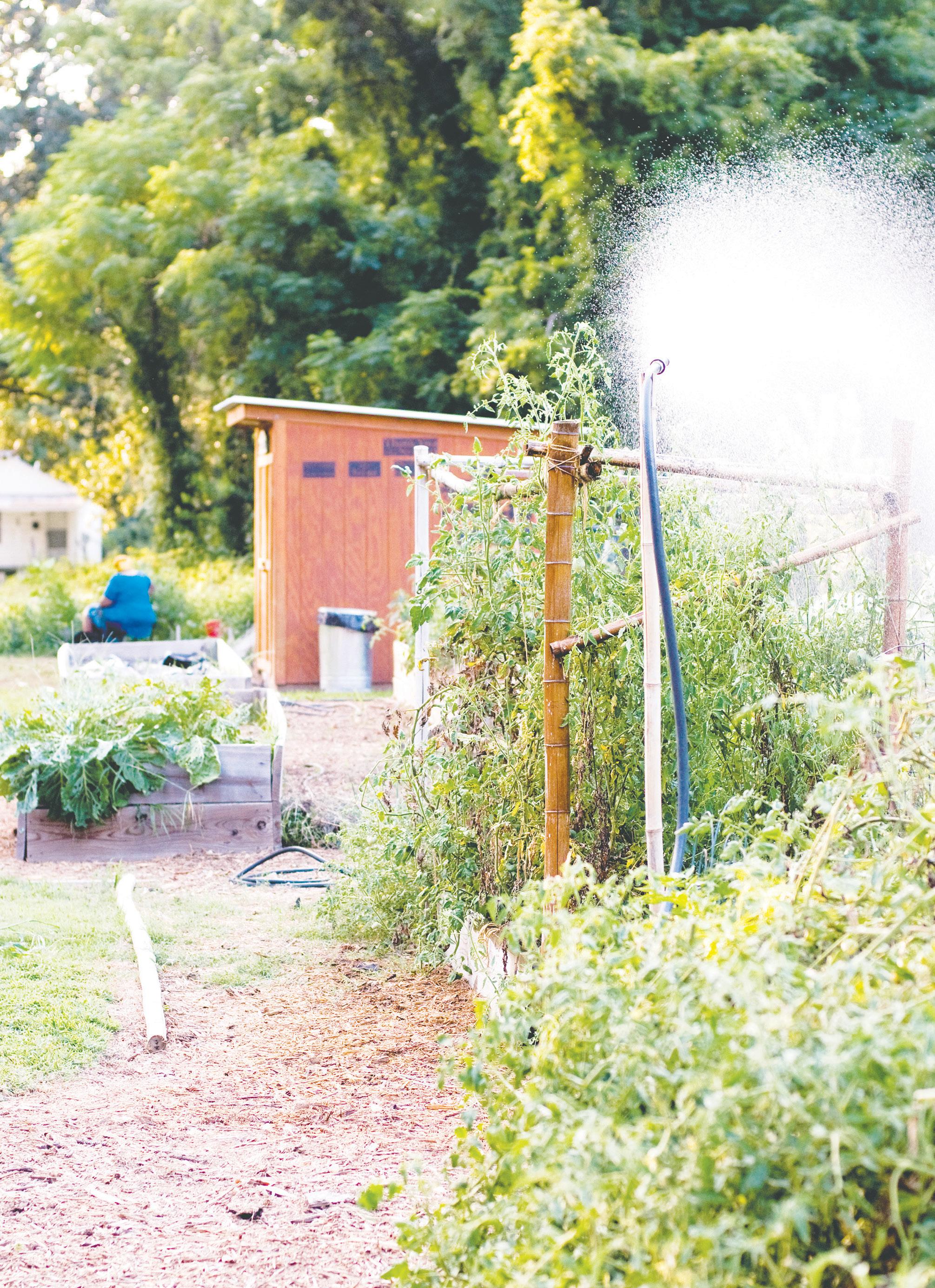
North Carolina
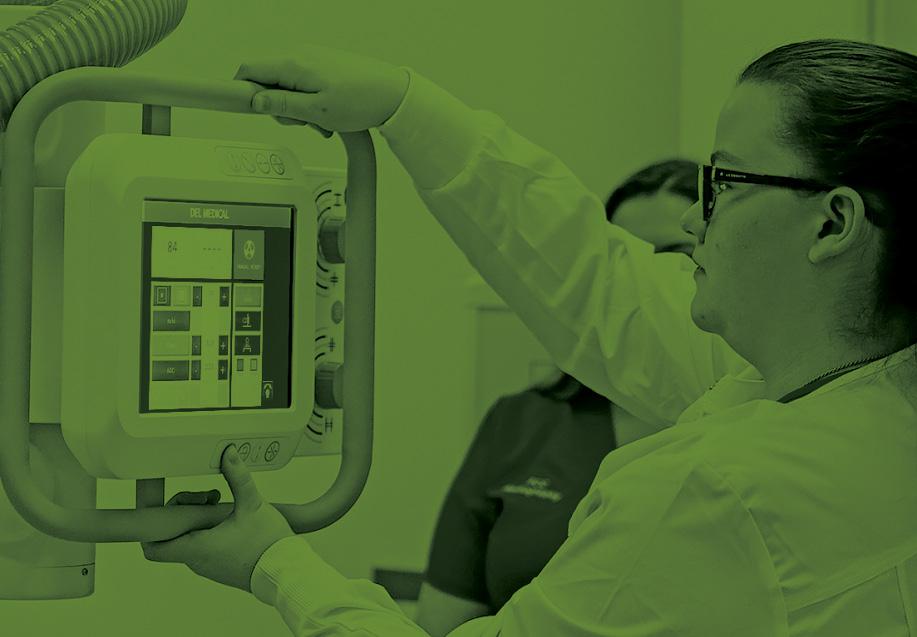





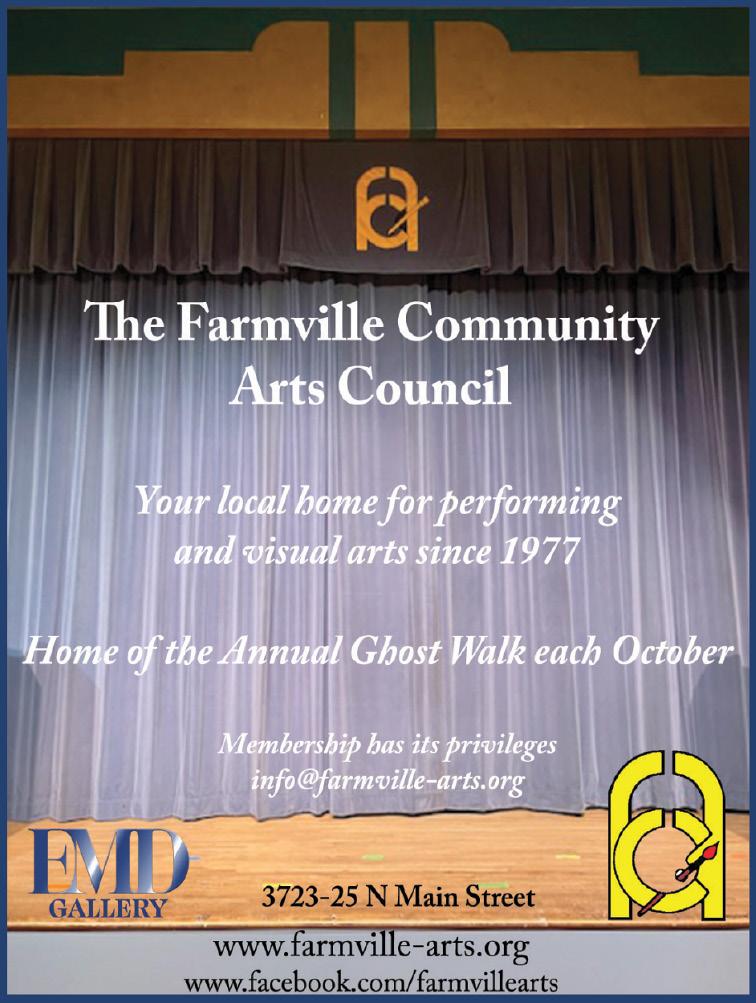
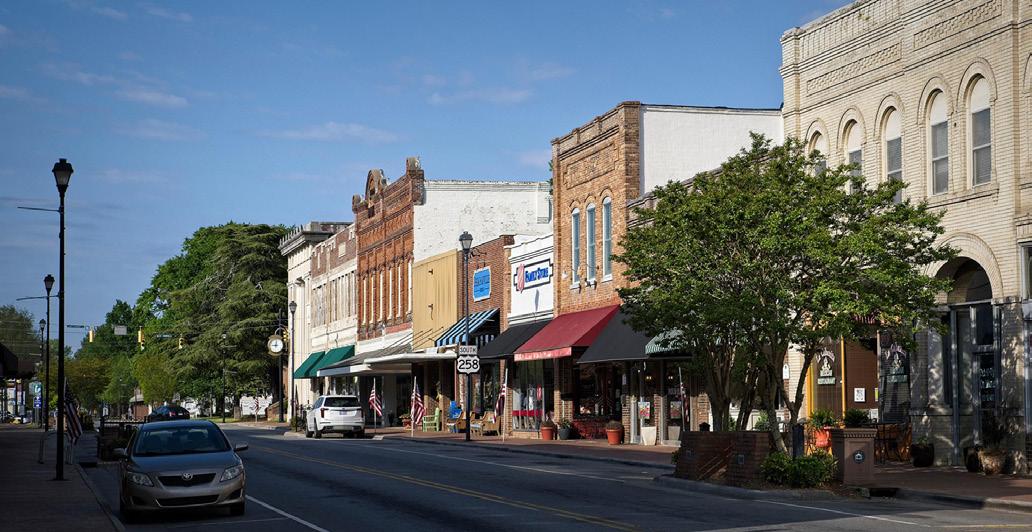
2 PITT CC.EDU WE ARE ACHIEVERS OUR STUDENTS ARE CAREGIVERS, DESIGNERS, ENTREPRENEURS AND BUILDERS. WE ARE PITT CC “Only Good Things Happen in Farmville!” Randy Walters 252-754-4670 Todd Edwards 252-717-5064 Jamin Dixon 252-327-4124 Bert Smith 252-717-3861 WE ARE THE FARMVILLE GROUP. IF YOU HAVE ANY INTEREST IN FARMVILLE OR THE GOOD THINGS GOING ON HERE, PLEASE CONTACT US!
4 Pavilion for the People: Nathan R. Cobb Sr. Foundation gives back with Farmville's newest place to gather
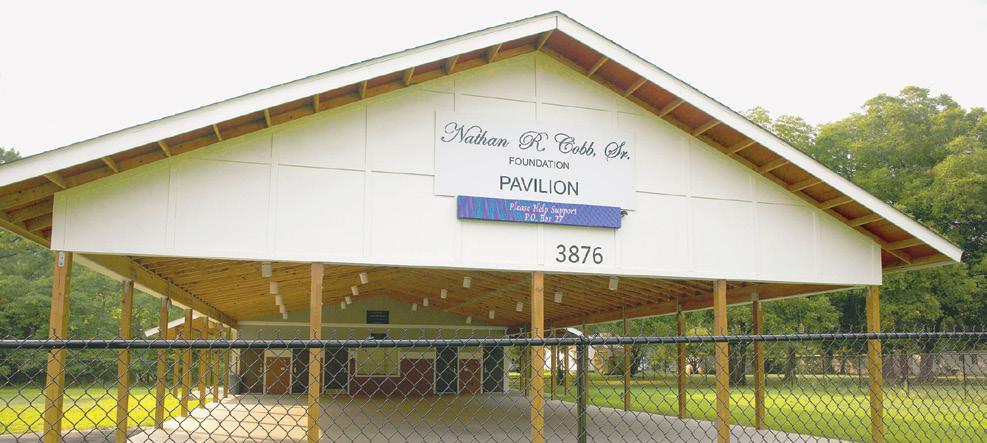
10 Sharing the harvest: Grassroots effort grows to increase access to nutritious foods
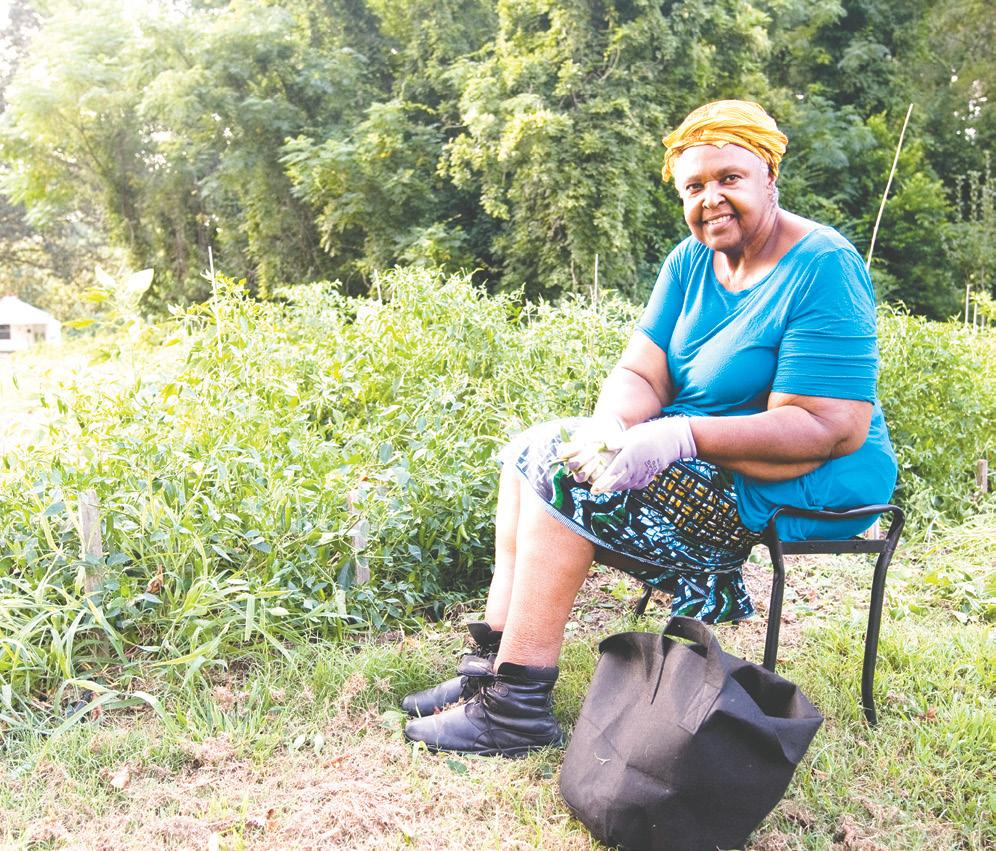
16 More than a meal: Community Outreach Soup Kitchen serves lunch, nourishes souls
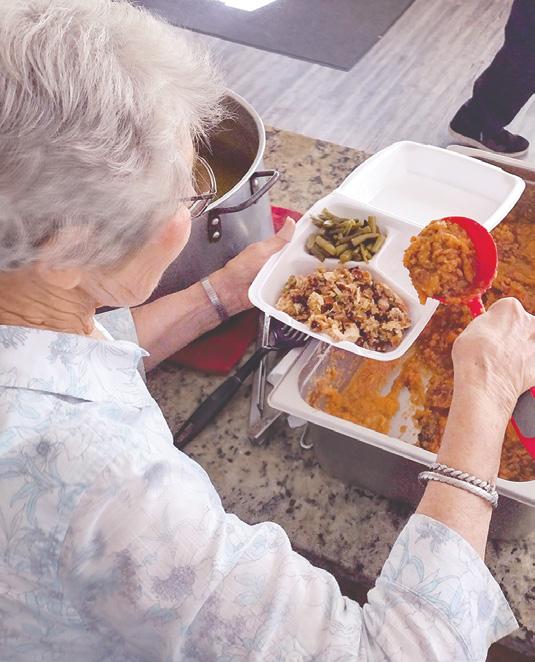
20 Waste not want not: Plant makes impact by recycling chicken litter to generate poultry power

25 Rich in Scouting tradition: Farmville Troop’s history spans generations

32 A look back: Farmville Veterans Memorial dedicated 15 years ago

3
Farmville Magazine is an annual publication of The Standard newspaper and Adams Publishing Group-Eastern North Carolina, 1150 Sugg Parkway, Greenville, N.C. Mark Cohen is the publisher. Bobby Burns is the editor. Call 252-329-0505.
Table of CONTENTS
Pavilion for the People Nathan R. Cobb Sr. Foundation gives back with Farmville’s newest place to gather
By Donna Marie Williams and Bobby Burns
A trip to Nashville, Tennessee, years ago inspired Farmville’s newest place to gather.
Alma Cobb Hobbs was visiting the city known as the Athens of the South for the frst time when she had a chance to visit its replica of the Ancient Greek Parthenon.
A nearly exact copy in scale and style of the Greek structure, it serves as a reminder of the ancient birthplace of democracy.
When the time came years later to build the Nathan R. Cobb Sr. Pavilion in Farmville, Hobbs thought it should be equally symbolic, she said. And while it may not be as grand as the Parthenon in size or material,
the facility opened a year ago by the Nathan R. Cobb Sr. Foundation stands proudly as a place for the people.
“To put a pavilion in a community is to suggest there are no doors to keep people out,” said Hobbs, daughter of Nathan Cobb and president of the foundation created to carry on his legacy of community service and mentorship. “It’s a place for the community to have community events. It’s all for the people.”
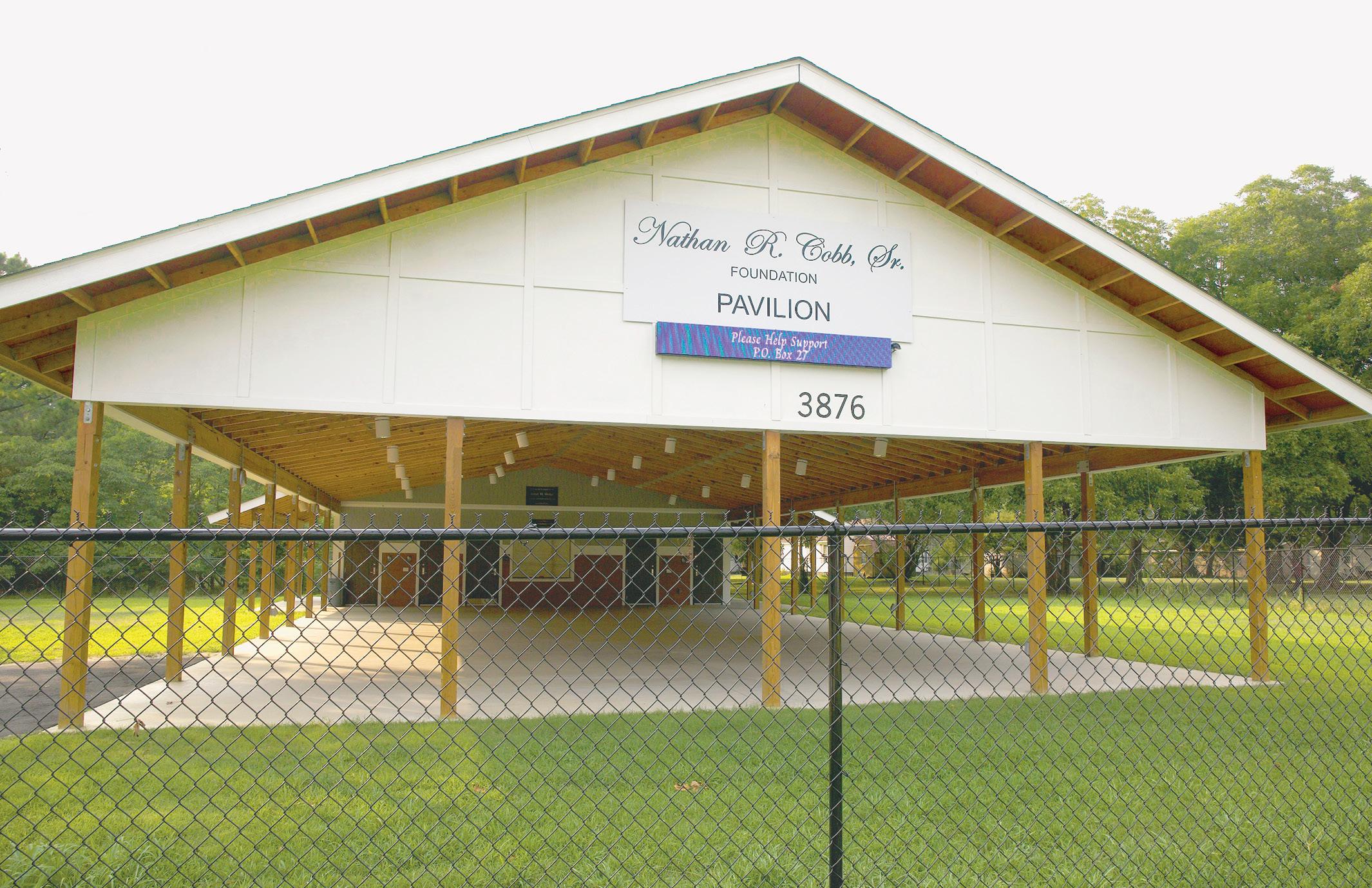
GATHERING PLACE
The community came together for a long-awaited ribbon-cutting ceremony at the facility on Sept. 8, 2022. They gathered in a sturdy outdoor shelter large enough to hold seats for 250 in a tree-shaded lot at 3876 S.
Main St., beside the Farmville Community Center.
An enclosed area at the back of the shelter houses four bathrooms and a commercial kitchen approved by the Pitt County Health Department. Everything is ADA-compliant.
The kitchen sets the pavilion apart from other outdoor venue spaces as renters are able to prepare meals on-site rather than hiring a caterer or bringing in food from home.
It features a commercial range, counter space and refrigerator. Sinks and a janitorial closet also are available.
The kitchen also can be rented by startups and individuals who want to sell food but lack the commercial-quality facility to make
it. Chairs and tables are stored on the premises and are available for rent.
Uses for the space include birthday parties, family reunions, exercise classes, school reunions, weddings and more.
“We can transform it into whatever they want it to be,” Hobbs said.
Plans are underway to host a farmer’s market and a gospel festival at the pavilion. It even hosted Taste of Farmville in November, Hobbs said. But it’s open to anyone who would like to rent it.
User fees will help fund scholarships awarded by the foundation to local high school students to attend college annually. The group also helps families in distress due to fres and other difcult
4
Photo by Bobby Burns
circumstances.
FOUNDATION OF SERVICE
The Nathan R. Cobb Sr. Foundation was founded in 2000 by his wife, Hazel B. Cobb, their children and family members. Mrs. Cobb is deceased and Alma Cobb Hobbs is now president of the organization.
It raises funds through events, contributions and other sources and awarded its frst round of scholarships in 2001. Since then, the group has awarded scholarships to 98 students from Farmville schools.
The group says that in all it has provided more than $150,000 in scholarships, aid to families and for spiritual education in the Farmville community. The work is a refection of

her father’s lifetime of giving back to Farmville, Hobbs said.
“The Foundation really stands on the principles and character of my father. It’s not him the person, but his character and how he impacted the community. He was responsible, accountable, fair, caring and a good citizen. He taught others how to be that way too,” Hobbs said.
Cobb Sr. was born on July 4, 1915, in Macclesfeld, and later settled in Farmville. He married Hazel Bullock in 1942 and joined the U.S. Army to serve during World War II through 1945. He was a contractor for A.C. Monk tobacco company and together with his wife ran a grocery on Walnut Street that was a center for the black community and a place where he mentored many
young men who later entered the ministry.
He involved himself in the local schools, the Boy Scouts, the American Legion and Knights of Pythians and was devoted to his faith and was a leader at St. James Free Will Baptist Church, according to a biography provided by the foundation. He helped provide for his extended family, including providing care and shelter for nieces and nephews, and always put God frst in everything.
“He was highly respected by the general public because of his concern for people, his sagacity, his devotion, his diligence and his dedication,” the biography said. “His willingness to reach out to lend a helping hand was a part of his character. He will be remembered as an ordinary man who did extraordinary things.”
THE PERFECT SPOT
Hobbs said her father’s drive to do extraordinary things was behind the foundation’s decision to build a pavilion for the people and to give back to the town — although at times it seemed like it would not happen. Among the obstacles was money.
The group approached the U.S. Department of Agriculture, where Hobbs, who holds a doctorate from N.C. State University, worked for more than 30 years before retiring as a deputy assistant secretary.
The foundation in 2019 applied to the USDA for $440,000 in funds designated to help economic development in rural communities. But it needed partners to secure the grant and raise a 25 percent match.
5
NRCS Foundation board members, elected officials and supporters broke ground for the pavilion in December 2021.
Photo by Willow Abbey Mercando
Foundation board members, elected officials and supporters celebrated the completion of the the Nathan R. Cobb Sr. Foundation Pavilion with a ribbon-cutting ceremony on Sept. 8, 2022.
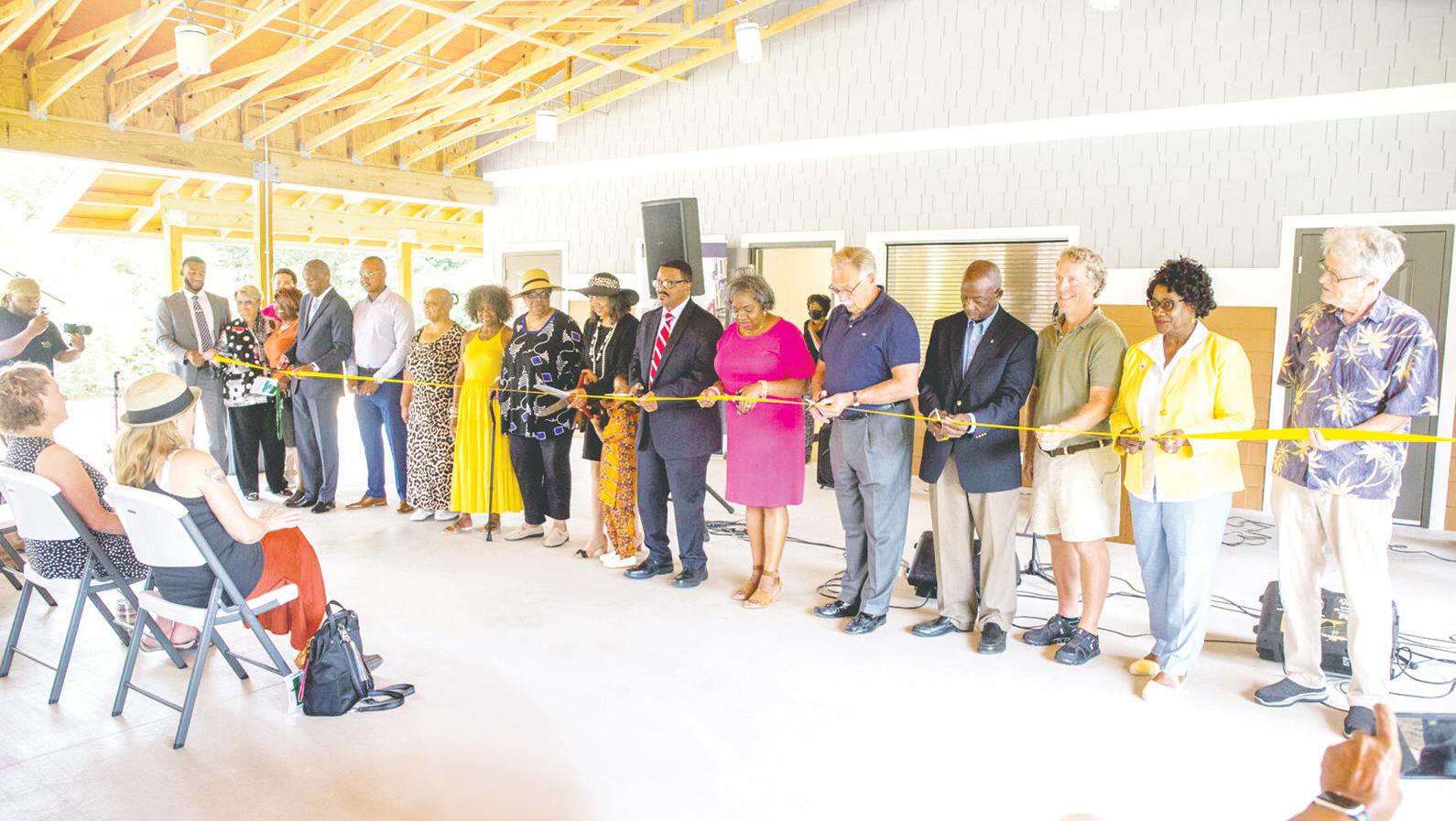
Photos by Willow Abbey Mercando
The Town of Farmville stepped in as a governmental partner, Hobbs said. “The grant required the town to partner with us. They were

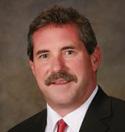
excellent to work with,” Hobbs said, adding many in the community also gave donations to support the pavilion.


State, local and private funds helped the foundation raise the match, which ultimately would be awarded in 2020.

6
NCSVPR44163 *North CarolinaFarm Bureau® Mutual InsuranceCo. *Farm Bureau® InsuranceofNorth Carolina, Inc. *Southern Farm Bureau® Life InsuranceCo., Jackson, MS *Anindependentlicensee of the Blue Cross andBlue Shield Associa on (252)753-3321 Farmville 3384 EWilson Street Farmville, NC 27828
Phillip Irvin Agent Carlton Venters Agency Manager Kevin Wainwright Agent nc
ins.com
Alma Hobbs Cobb, president of the Nathan R. Cobb Sr. Foundation, speaks to guests at the ribbon-cutting ceremony in September 2022.
Completed in 2021, the Nathan R. Cobb Sr. Pavilion is 4,000 square feet, equipped with four bathrooms and a commercial kitchen, and can seat 250 people. Plaques pay homage to the late Hazel B. Cobb, wife of Nathan Cobb Sr., and first president of the Nathan R. Cobb Sr. Foundation, and Janet H. Sledge, a major donor whose surprise bequethal helped make the building possible.
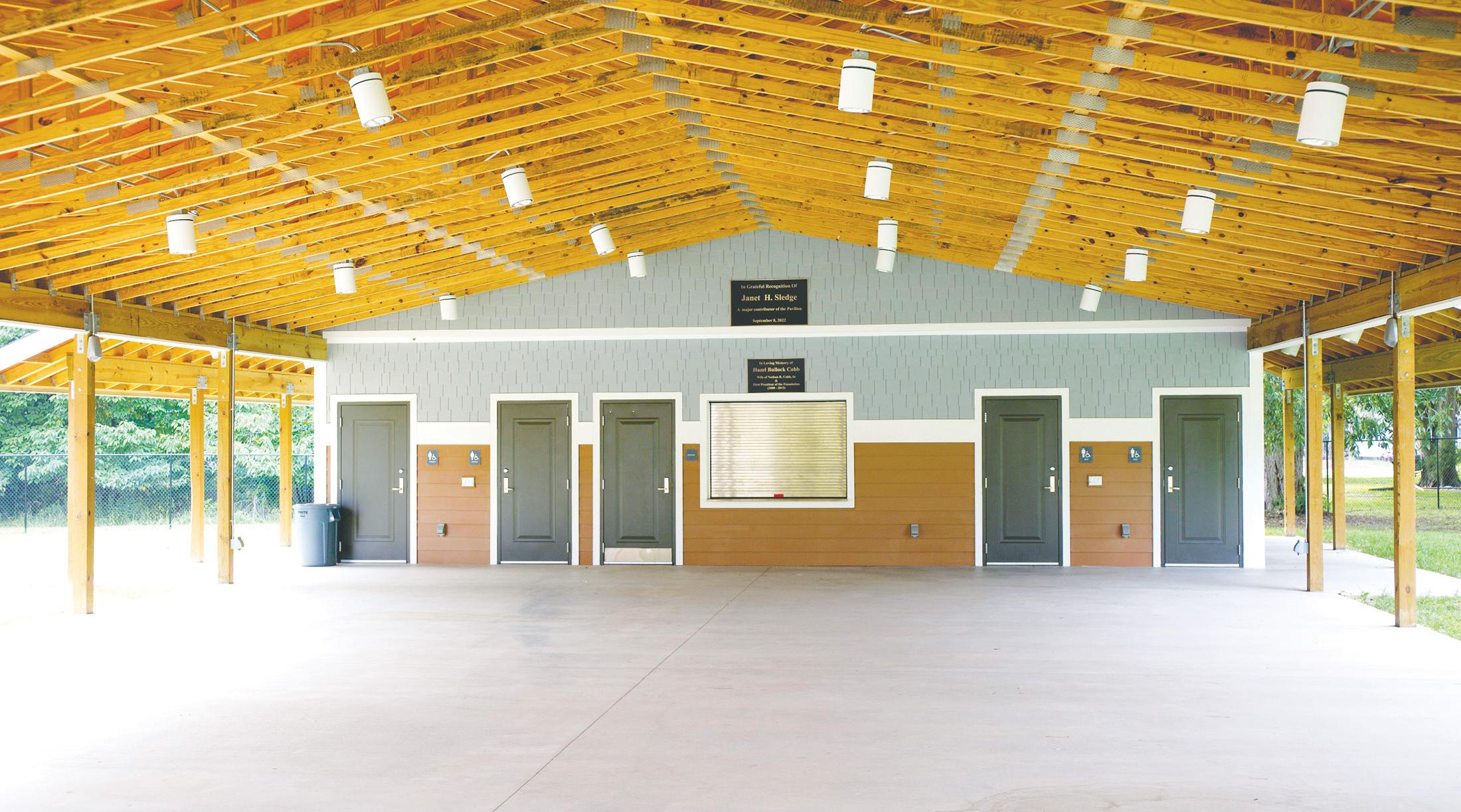
Meanwhile, the group had to fnd the right location.
“When we applied for the grant, we were really not looking to build a building. We were looking to renovate something in Farmville,” Hobbs said. “But as we were looking for a building, we kept running into roadblocks. Finally, we said, let’s just build one.”
With help from a community member, the foundation found the perfect spot next to the town’s existing community center and adjacent to property owned by Hobbs’ family, not far from where her parents ran the store started by her maternal grandfather.
“It was unreal,” Hobbs said. “It was almost like an omen.”
AN UNEXPECTED GIFT
Even after receiving the grant and fnding the ideal location, board members of the foundation were unsure of the pavilion’s future.
“When we applied for the grant, because of COVID causing an elevation in material prices and contractors to elevate their pricing, by the time we got our grant, prices had almost doubled,” Hobbs said.
The foundation held another fundraiser to help cover the cost but still fell short of its goal. That’s when someone remarkable stepped in, Hobbs said.
During one of the foundation’s scholarship awards programs, it had invited Janet Sledge to speak to the recipients. Sledge was a writ-
Board members of the Nathan R. Cobb Sr. Foundation, including Annette Moore, Rudy H. Cobb and board president Alma Hobbs Cobb, from left, say the pavilion is a way the foundation gives back to Farmville and raises money for scholarships and community assistance.

er for the USDA and Forest Service Hobbs knew from her days in Washington, D.C. Hobbs she was so impressed by the foundation and Farmville and the hospitality she received, she told Hobbs she was going to remember the group in her will.
Hobbs said she thanked Sledge but didn’t expect her to really follow through with it. “I mean, who does that?”
she said.
Sledge died in March 2019 and months later Hobbs received an unexpected but welcome call.
Sledge honored her promise and left a signifcant amount for the foundation. The funds were enough to cover the remaining costs, Hobbs said.
“I was pleased, but it was a shock,” Hobbs said.
7
Photos by Bobby Burns
The group placed a plaque to honor Sledge and her gift prominently at the pavilion, near the peak of the ceiling above the kitchen’s serving window.
The foundation, which had secured JKF Architecture and Burney & Burney Construction to design and build the pavilion, broke ground in November 2021.
BUILT TO GROW
Sitting beside the indoor Farmville Community Center, the outdoor venue was designed to enhance the space and bring people a centralized, convenient location, said Hobbs, who also sits on the Farmville Board of Commissioners. “Its purpose is to serve the town. It is an

outreach to the community.”
The ribbon-cutting ceremony in September of 2022, brought together many who had helped bring about the pavilion’s construction, including Reginald Speight, a Farmville native who is the USDA Rural Development State Director.
“Our rural citizens need a space where they can come together for community events and fellowship. This pavilion is a continuation of Rural Development’s investment into this rural community,” Speight said at the time.
Hobbs distributed plaques thanking partners for their assistance and support including Mayor John Moore on behalf of the Town of
Farmville, Speight and Kim Daniels, a USDA Rural Development area specialist, the Pitt County Board of Commissioners, architect John Farkas of JKF Architecture and Owen Burney of Burney & Burney Construction.
“What a journey it has been for the Nathan R. Cobb Sr. Foundation. We would not have reached this incredible milestone if not for all of our supporters, donors, family and friends,” said Hobbs. “All of you were ultimately responsible for making this day a reality.”
Hobbs said recently that building and opening the pavilion is just the beginning as the foundation has ambitions to add parking and
a back entrance and expand what the facility can ofer. She said more details will be announced as the group is able to solidify its ideas.
“We built this for growth so we can grow into whatever we need it to do.”
Anyone who wants to rent the facility should call 252-342-0878. User fees vary depending on how patrons plan to use it. All proceeds go toward upkeep and to support scholarships and community assistance. The foundation also is accepting contributions for an endowment established recently in the name of Hazel Bullock Cobb. The fund is intended to support the foundation’s mission in perpetuity.
8
A large crowd of well-wishers and friends helped celebrate the opening of the pavilion during a ribbon-cutting ceremoney on Sept. 8, 2022.
Photo by Willow Abbey Mercando
McDavid Associates, Inc.
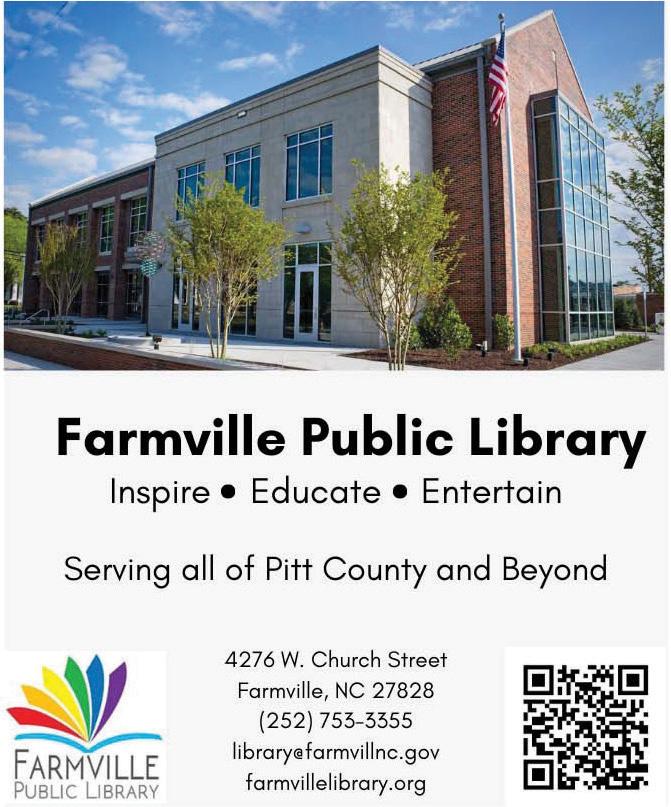







9 Ourcompany stands amongthe most respectednames in the design, buildand installationtrade. We specializeincustommetal fabrication andmill rightser vices.
EN GINEER ING |P LANN ING |L AND SURVEY ING
UR SAF ET Y IS OUR BUSI NESS ( 25 2) 753 -2 13 9 Main Office 3714 NMain St. P.O. Drawer 49 Farmville, NC 27828 Goldsboro Office 109E Walnut St. P.O.Box 1776 Goldsboro,NC27533
YO
Sharing the harvest
Grassroots effort grows to increase access to nutritious foods
By Emily Bronson
A grassroots efort in Farmville that grew from the fellowship of the town’s community garden members and faith community is working to ensure good food gets into the hands and mouths of everyone who needs it.
Seeds for the work germinated when leaders from a
dozen organizations in town that make feeding the hungry part of their mission began to hold regular meetings, said Zac Hackney, director of the Farmville Community Garden.
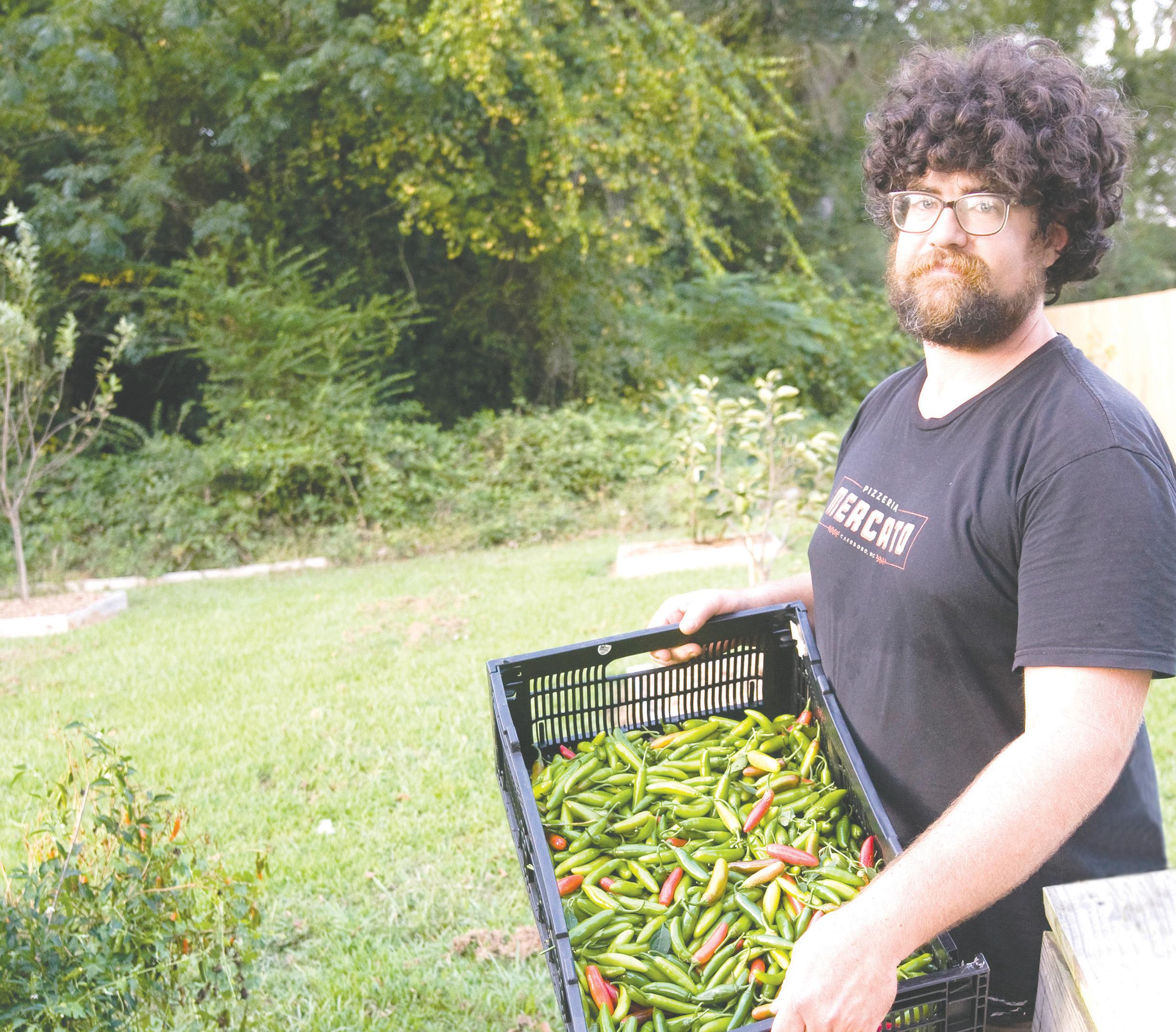
From those meetings, the Farmville Food Task Force was born with a mission to coordinate the town’s disparate outreach eforts. Among
its frst steps was to invite Hackney and the community garden to be part of the work.
“The Farmville Food Task Force is a forum for all of those diferent groups to get together and talk about what they need,” said Hackney, a relative newcomer to Farmville who has a background in the restaurant business and now works in nutrition education for the N.C. Cooperative Extension.
Task force members in 2022 rolled up their sleeves and conducted a community needs assessment, Hackney
said. “And one of the things assessed was there’s a lot of people doing food services in Farmville but the groups that are doing the food services don’t collaborate well together.”
Hackney said that the existing services did not have any route to collaborate. There was a need for partnership, he said, and the task force began flling that void to get resources to food insecure people — many who don’t have reliable transportation — where they need it and when they need it.
Ongoing collaboration
10
Zac Hackney harvests hot peppers at the Farmville Community Garden on Aug. 25.
Photos by Scott Davis
among the Farmville Community Garden, the Community Outreach Kitchen, the Task Force, and the Farmville Food Hub, a separate group that advanced from ideas discussed at Task Force meetings, is an example of how the efort is evolving and growing.
WASTE NOT, WANT NOT
The Farmville Community Garden is a third of a city block at 4355 W. Cotton St. at the intersection of St. George Street. The town owns the property but has supported members of the garden since they frst turned the soil there in 2016. It started as a place not just to grow food but to provide a space for community members to come together.

The members work 38 plots individually. Each plot is numbered and has either a family or a group that takes care of it, Hackney said. Eighty-fve members in all care for the beds. Families and church groups are very active, he said.
Residents can join the garden at no cost, and all the supplies and seeds they need are free to them as well. It runs on community donations and support from the town — and support of the garden project is diverse, Hackney said.
“At a glance, it is a bunch of individuals raising their beds. How can you have community support?” Hackney said. “And the answer is, even though there are individuals running the beds, we get the beneft of the community support that each of
those individuals brings.”
Hackney said a big goal of the garden is to make sure that food does not go to waste.
“It is 100 percent up to them (garden members) what they do with their food,” Hackney said. “It’s free, your soil is free, your seeds are free, your plants are free, your tools are free. If you just want to grow for yourself, awesome. But nine times out of 10, we fnd that even the gardeners who just want to grow for themselves, at a certain point they say, ‘Oh, I’ve got too much.’”
As more people joined and the garden grew, members began donating their surplus to neighbors and friends, churches and food outreach programs. The Food Task Force and the Farmville Food Hub helped to establish
partnerships and processes. Hackney has been at the center of many of the collaborations, community members said.
NEW KID IN TOWN
Hackney and his family moved to the area in 2021 when his wife took a job with ECU Health. The garden was one of the reasons they chose Farmville as their home, he said.
Like other aspects of life in town, the garden ofered a real sense of community, he said, and it satisfed a passion for fresh food that aligned with his work with the N.C. Cooperative Extension.
A year after joining and maintaining his own beds within the garden, Hackney said he was approached by
11
Founded in 2016, the garden is located at 4355 W. Cotton St. at the intersection of St. George Street.
Hackney, who works with the N.C. Cooperative Extension by day, volunteer to helps garden members grow crops and maintains the Farmville Community Garden.
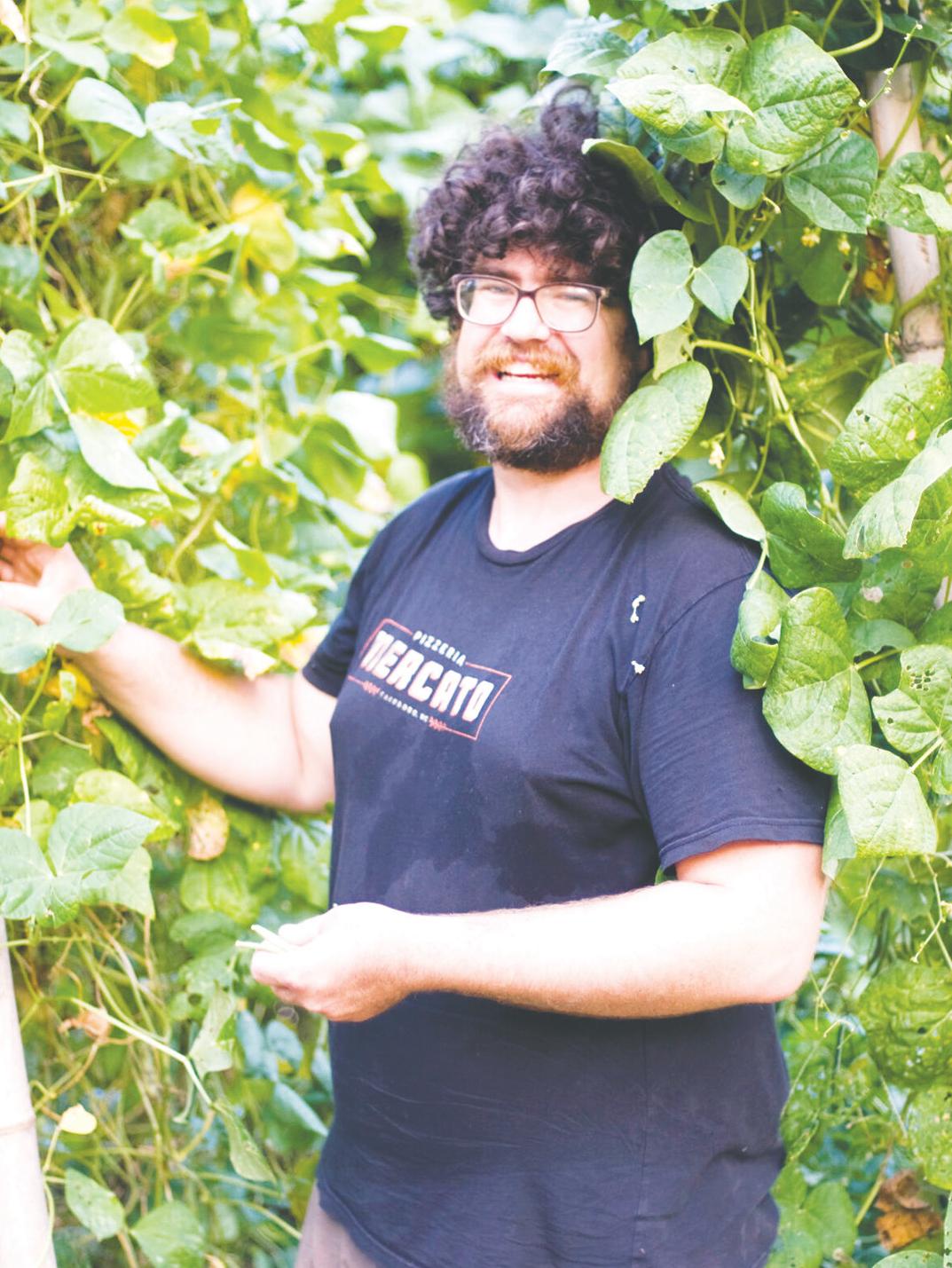

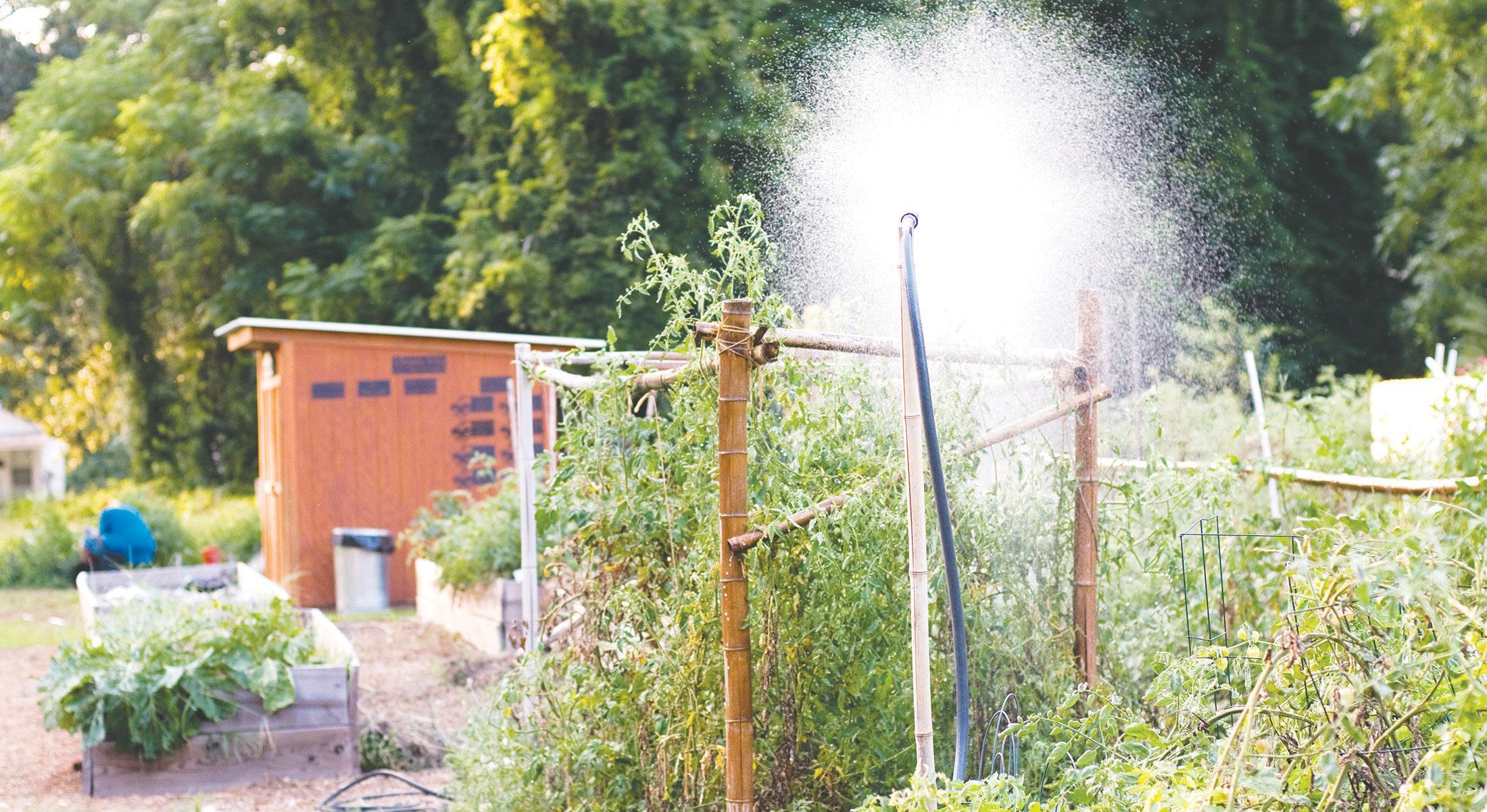
12
Food crops are not the only plants growing at the Farmville Community Garden.
the previous director of the project and asked if he wanted to take over as director.
Eulaia Williams, one of the co-founders of the Farmville Community Garden, said that Hackney has been a huge help to the garden and the collaboration efort between all the food distribution centers in Farmville.
“Since he got here … things have really gone to the next level,” Williams said.
This summer, the garden has been able to donate 500 pounds of fresh food a month to the Community Outreach Kitchen, which serves free lunch three times a week and allows patrons to select the produce they want and take it home with them.
In all, food grown by gar-
den members helps to feed 150-200 or more people in Farmville through the Community Kitchen and other outreach eforts.
Hackney also was able to lend expertise from his work with the Cooperative Extension’s Expanded Food and Nutrition Education Program to the Food Task Force. The group started the Farmville Food Hub, which currently is working to secure 501(c)(3) nonproft status. Nonproft status will help it secure grant funding and establish formal working relationships with other nonproft and government organizations, Hackney said.
The garden group secured a $2,500 community organization grant from the Town of
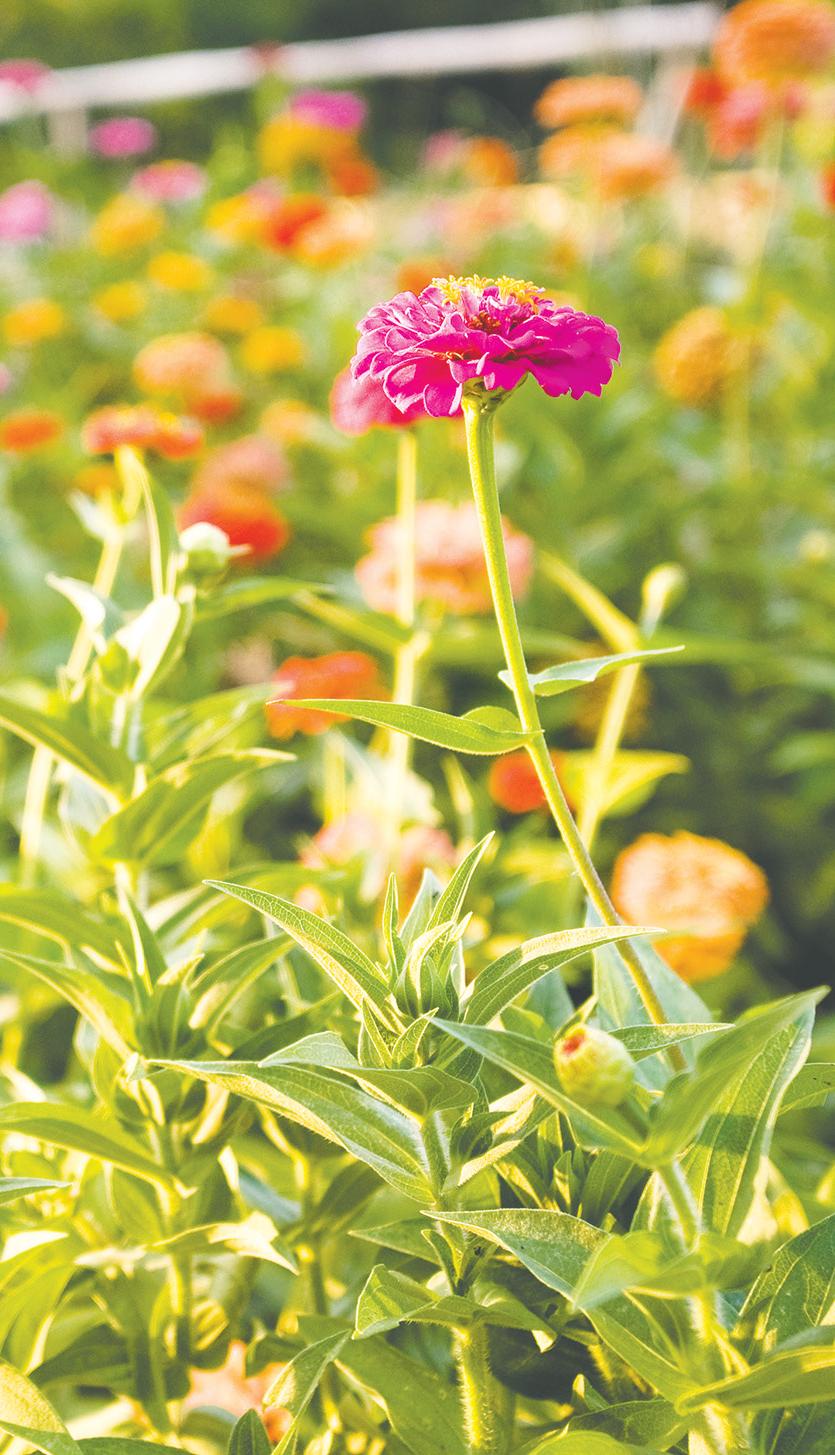
Farmville. The money is being used for educational programs at the garden, expanding beds and beautifying the grounds. The Community Garden also has collaborated with the Farmville Food Hub on educational eforts.
The Farmville Food Hub applied for and secured a $5,000 FCS Innovative Grant from the Family & Consumer Science program within the Cooperative Extension.
The group and Community Outreach Kitchen used the money to make renovations at the facility and to purchase a refrigerated display case to hold produce from the garden and other food donated from sources like Food Lion. Patrons at the
kitchen are free to take from the case what they need.
The grant money also is funding classes at the pantry in partnership with the Cooperative Extension that cover cooking, nutrition, canning and other topics so that patrons can learn how to prepare meals with fresh food and store produce available from the kitchen.
Hackney, who recently took a new job as the local foods coordinator with the Pitt County Farm and Food Council — which does work on a county level that is similar to grassroots eforts in Farmville — says his work in town is strictly volunteer. But it has earned him gratitude and praise from his neighbors.

13
Hackney harvests eggplant at the Farmville Community Garden.
“Zac is involved and he got involved very quickly in all of the food distribution channels in Farmville and in Pitt County,” Williams said. “He’s been able to just transform that (Farmville Community Outreach Kitchen) into something that’s really encouraging right now.”
MEETING NEEDS
Williams is one of 13 board members appointed to the Pitt County Farm and Food Council. Nearing the end of her second four-year term, she said her tenure on the council has opened her eyes that many people in town have limited access to quality nutritious food — even though the council and other groups have worked to address it.
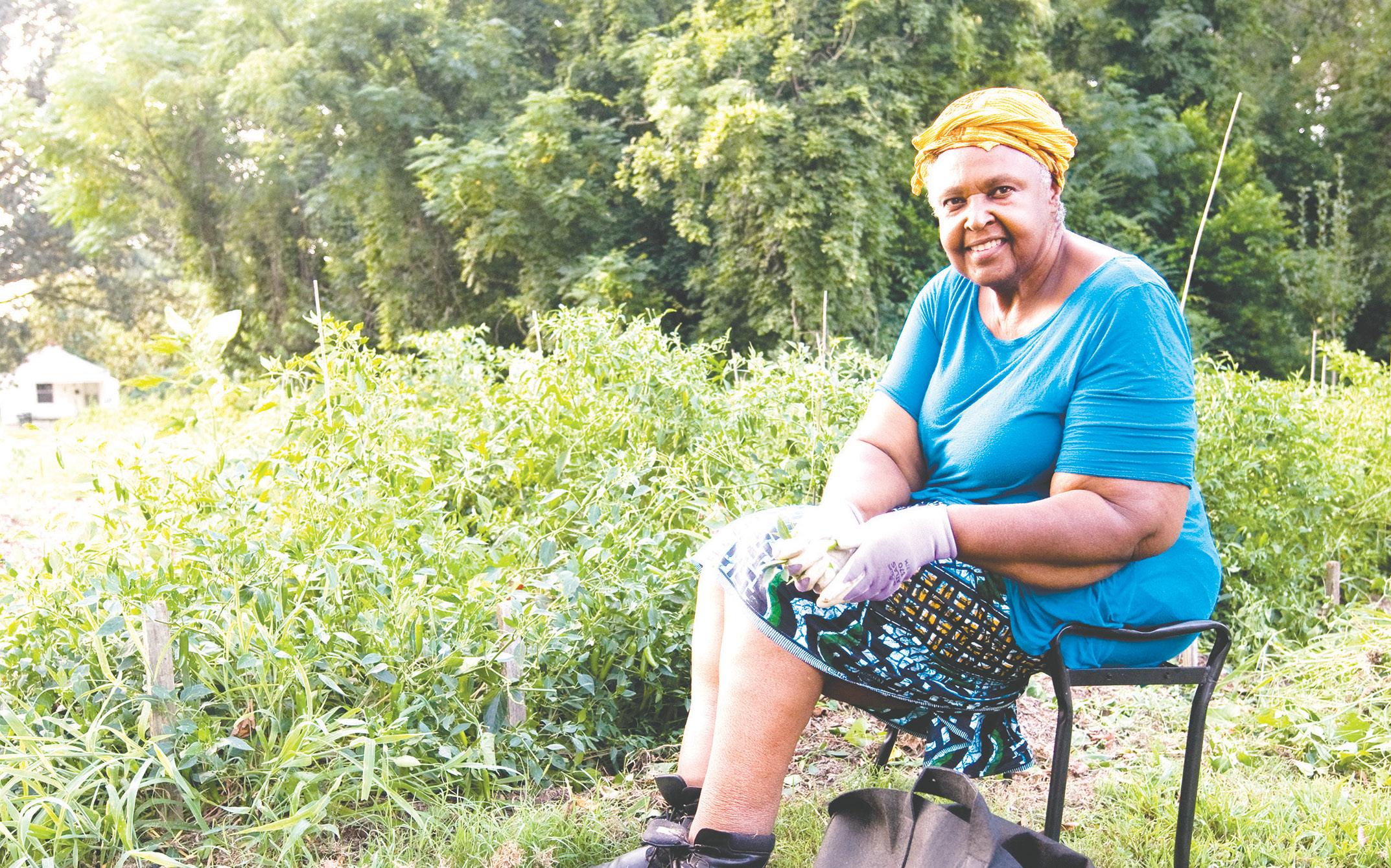
“This was my last term and there were food insecurity issues here seven years ago,”
Williams said. “Which is why a friend and I decided to get involved in any way we could to at least help people fnd where the distribution remedies were.”
Although the food distribution eforts in Farmville have grown in the past few years, Williams said that getting food to the people is still a challenge that needs to be addressed.
“We still have a real problem with transportation,” Williams said. “You can’t walk carrying a 25-pound box (of donated food) and take it home.”
The Task Force works to get food to distribution points like churches throughout town that are accessible by foot. Some of that food comes from the Community Garden, she said, whose members are happy to share.
“The Community Garden is a place for everyone,”
Williams said. “It is a place that ‘nourishes’ a sense of purpose in all those who participate.”
Janet Heath, director of the Community Outreach Kitchen, said it relies strictly on volunteers and donations to keep its doors open. “That’s why Zac has been such a great addition to the team because he has been a trailblazer for fnding ways to add to the distribution services.
“The garden has been in existence for a while,” Heath said. “But it really wasn’t until Zac became the president and became involved in it that it started beneftting the soup kitchen.”
Before the COVID-19 pandemic, the kitchen was open fve days a week and serving 30-45 people regularly, Heath said. Church and civic groups sign up to cook and serve meals, she said.
After the pandemic,
however, the number of volunteers shrunk, forcing it to shutter operations on Tuesday and Thursday, she said.
Currently, the kitchen is serving 50 to 60 people a day, she said, so even though it is open fewer days a week, it is serving more people.
“We don’t know where those people are coming from,” Heath said. “But that’s the whole purpose of us being there, is to help people who need it.”
That makes the garden a perfect match, Hackney said in an interview back in August, because bumper crops this year have given members more food than they can eat.
“This time of year, everybody has more tomatoes, cucumbers and okra than they know what to do with,” he said. “Nobody wants their food to go to waste.”
14
Eulalia Williams is one of the garden’s cofounders.










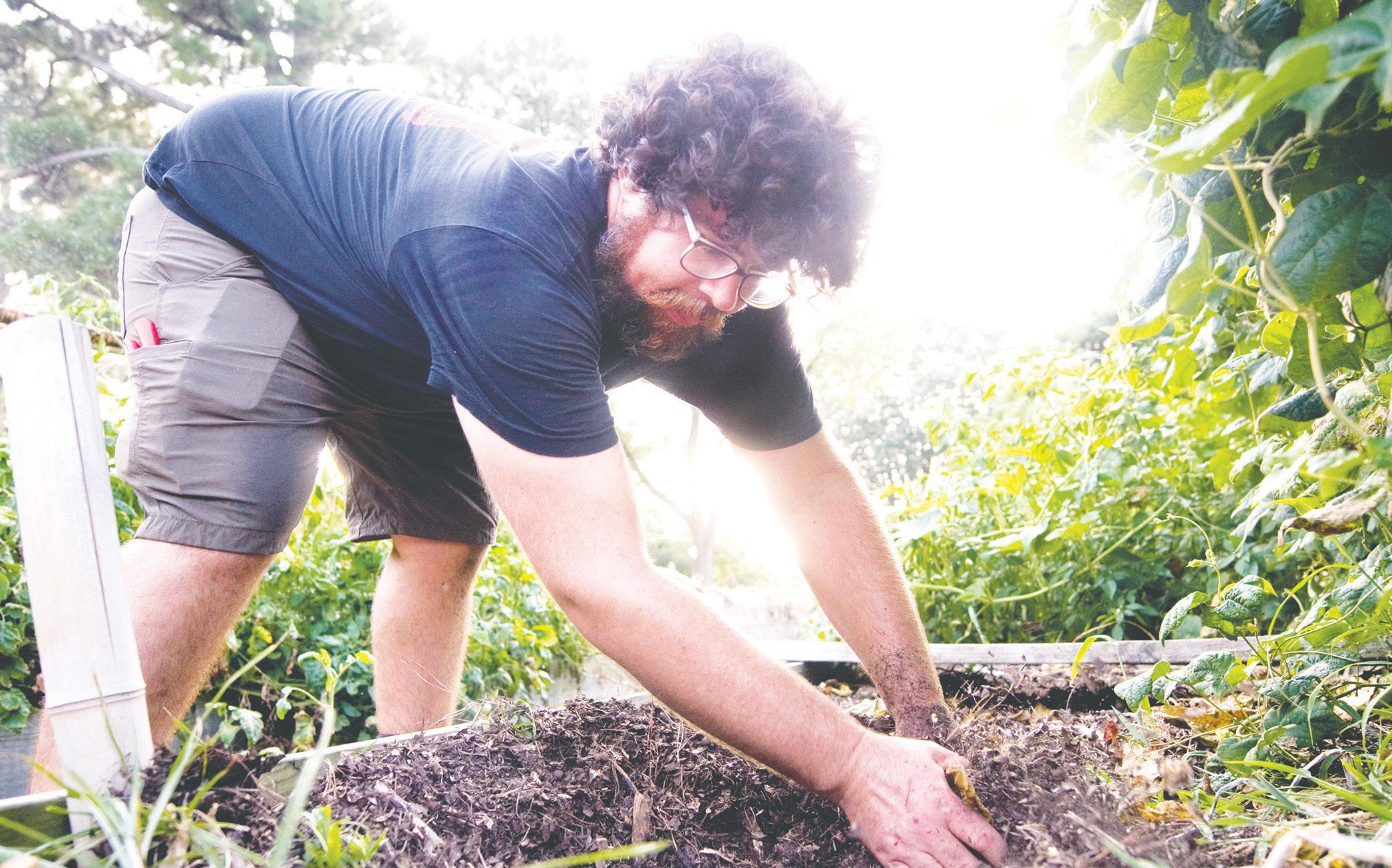
15 Art, antiques, furniture,silver,jewelryand more Dapper Dan’s 3743 S. Main St., Farmville• 252-753-7001 •dapperdansnc@aol.com
Hackney looks for leftover potatoes at the Farmville Community Garden.
More than a meal
Community Outreach Soup Kitchen serves lunch, nourishes souls
By Ginger Livingston
More than home-cooked meals, fresh produce and canned goods are ofered at Farmville’s Community Outreach Soup Kitchen. It’s a chance for people to be seen and their wants and needs to be met.
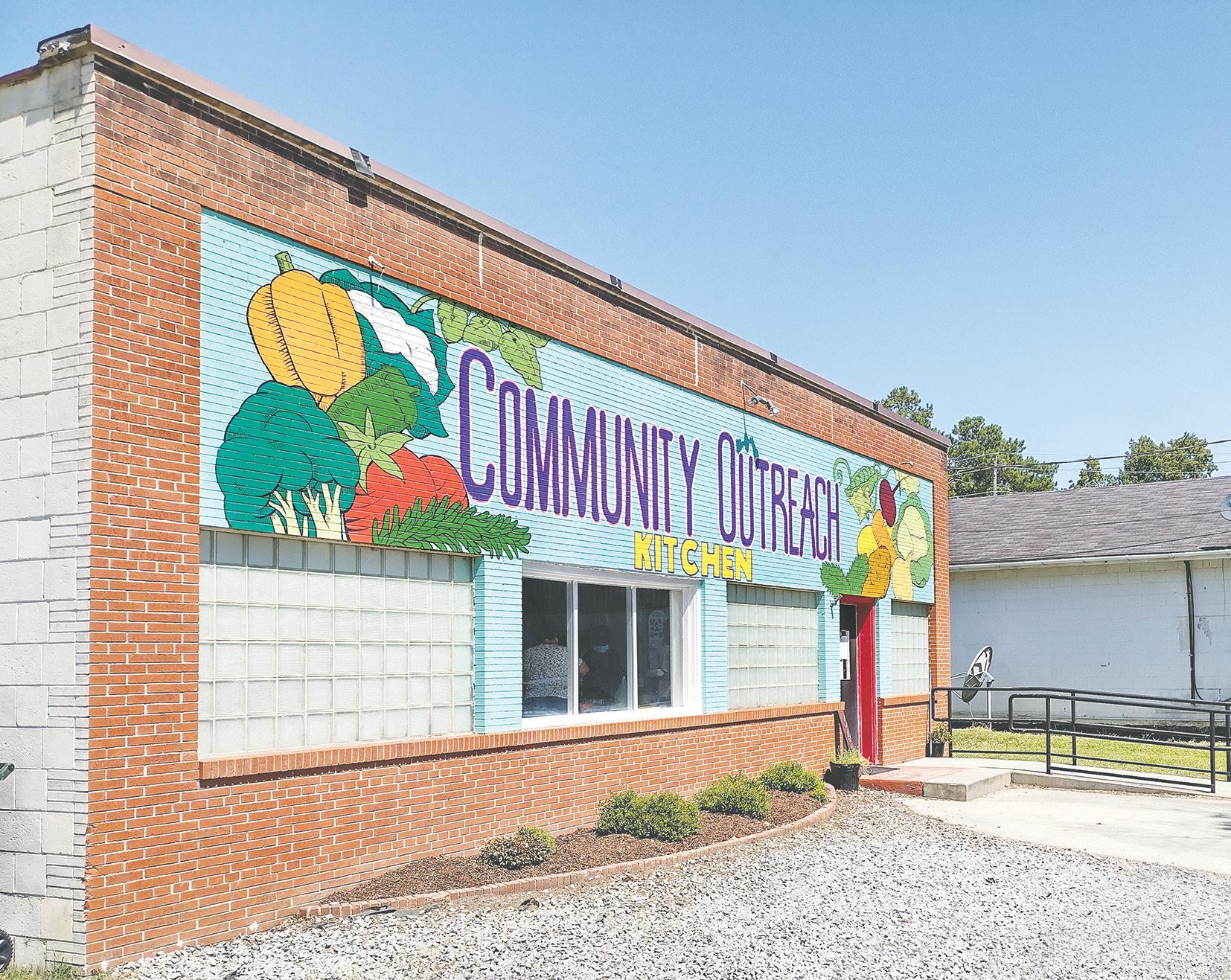
Moses Barrett Jr., a longtime client of the kitchen, found an easy-to-eat meal of chicken casserole, candied yams and green beans last month. He’s happy when the kitchen serves soft food because he has only one tooth.
“It’s a very helpful thing for the community,” Barrett said. “You get nutritional food, a warm meal. A lot of people are not able to have this.”
Community Outreach Soup Kitchen, 3492 S. Walnut St., Farmville, established more than 30 years ago by Emmanuel Episcopal Church, has changed during those decades. What once a wintertime service ofered three days a week, eventually expanded to a year-round operation serving meals fve days a week.
Then COVID-19 struck and the kitchen had to close.
In its aftermath, the kitchen reduced the number of days it’s open just as it’s seeing an ever-growing number of clients, said Janet Heath, kitchen coordinator.
“Once the pandemic hit it messed me up big time,” Heath said. “We were closed for about a year and half and once we opened back up a lot of the people who had been my volunteers in the past had either gotten involved in another form of outreach or they were no longer able to
help us. When we were able to start back fnally it was only Monday, Wednesday and Friday.”
And where the kitchen once served between 35-45 people daily, the number is now closer to 65 people on an average day.
Volunteers with Marlboro Free Will Baptist Church served 74 people one day in June. On Aug. 23, Marlboro served 52 people.
“We serve people on Social Security, people who have a job where they are just making ends meet. We don’t refuse service to anybody. Anyone who comes to the door is going to get a meal,” Heath said. A lot of the kitchen’s clients are older. Heath
16
Community Outreach Soup Kitchen is located at 3492 S. Walnut St., Farmville.
Photos by Ginger Livingston
estimates about 75 percent live nearby because they walk to the kitchen.
“The ones who do come in a car, they carpool and have three or four people in a group,” Heath said.
Barrett, 72, has been visiting the kitchen for about four or fve years. He comes every day it’s open.
“I could probably get some type of resource or help for the food because after paying your bills and everything, things are really tight. This does help,” Barrett said. “It’s one less worry because
Greenville is too far away to go for help.”
The kitchen opens at noon and operates until 1 p.m. One of the frst people in the door on one Wednesday in August was James “Disco” Smith, who has been picking up food for about a year.
Smith, whose love of dance earned him his nickname, lives alone so the kitchen gives him an opportunity to talk with other clients and the volunteers.
“They always pick on me but if I don’t come in here, they look for me,” Smith
Moses Barrett Jr. is a regular client of the Community Outreach Soup Kitchen in Farmville. Barrett said the lunches that are served three days a week help stretch his budget.
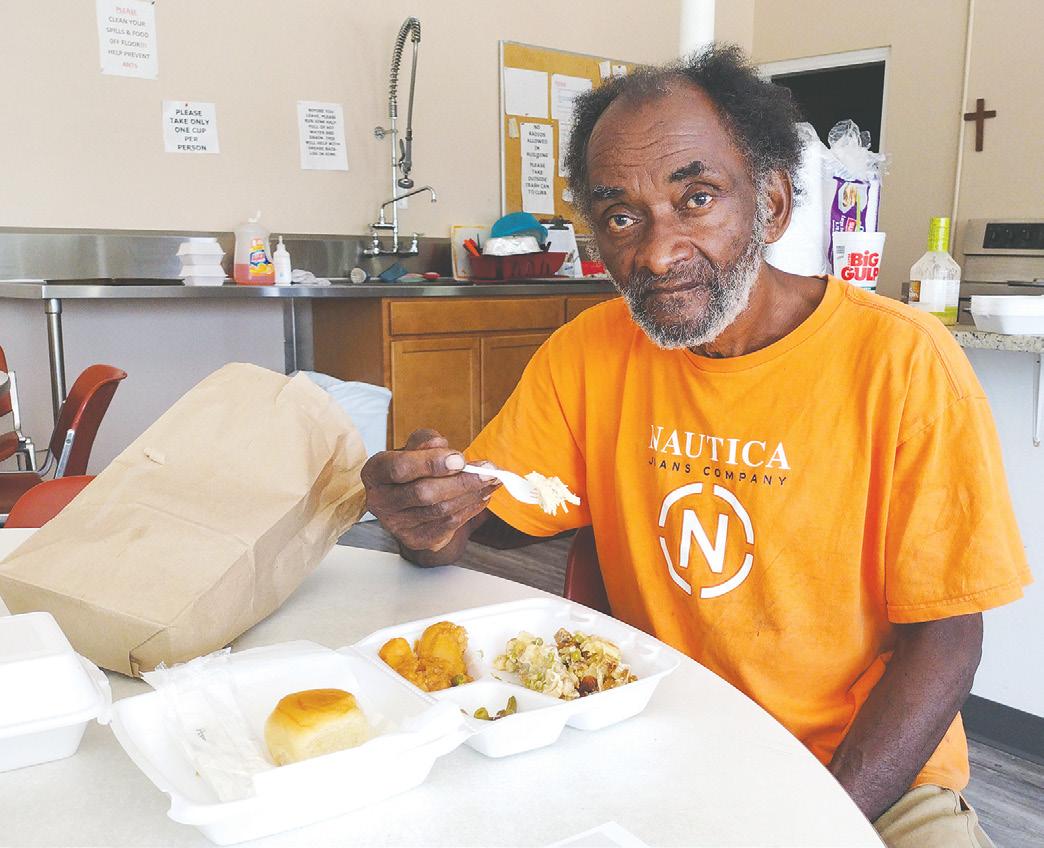
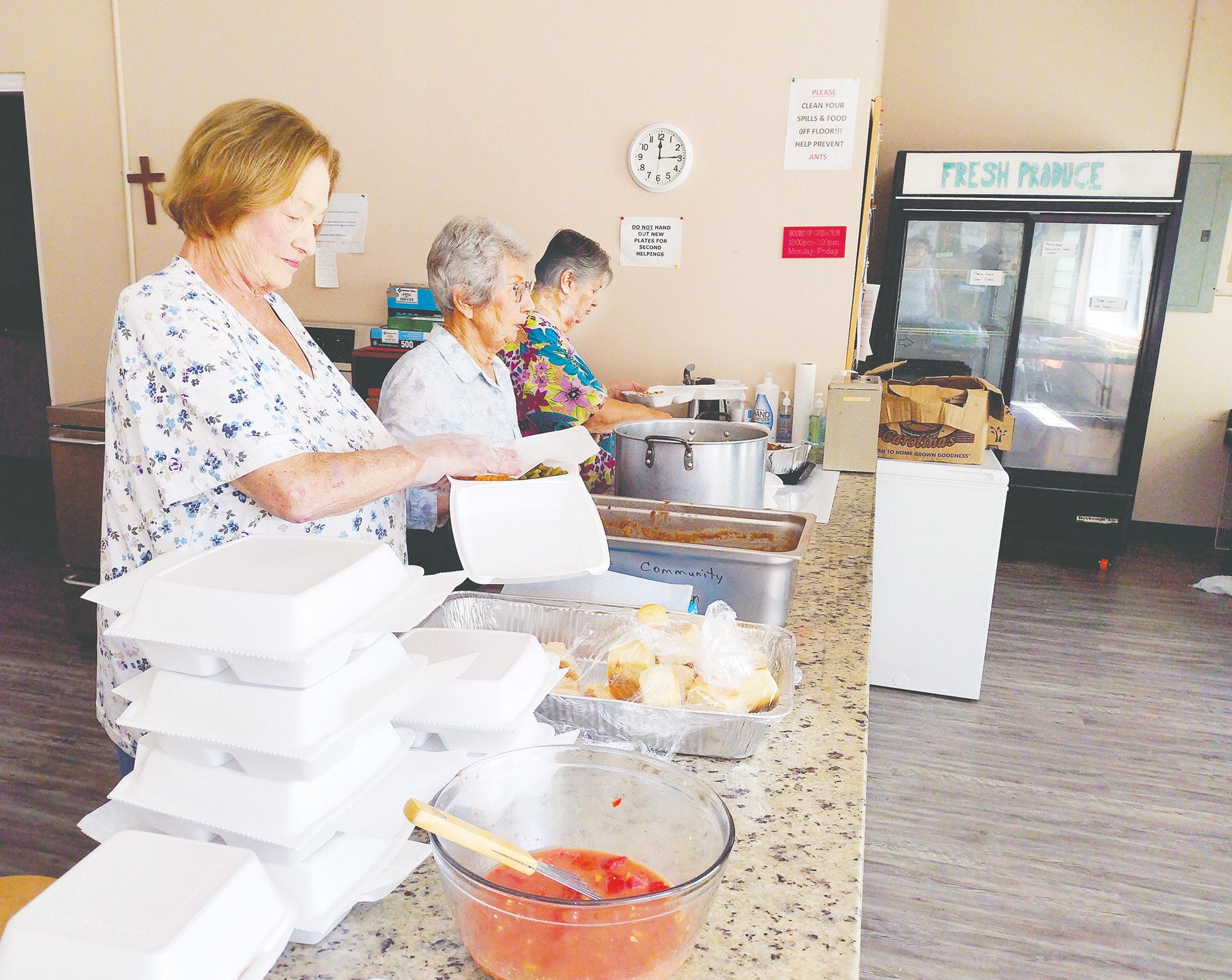
said.
He likes all the food the volunteers serve but tries to avoid cakes and other sweets because he has diabetes.
Lee Devonshire, a member of Marlboro Free Will Baptist Church who’s volunteered at the kitchen for 4½ years,
said they see a crosssection of the Farmville community. A lot of younger adults are visiting the kitchen, she said. When Marlboro frst started serving food at the kitchen, the majority of clients were male, said Gwen Skinner, another volunteer
17
Marlboro Free Will Baptist Church members, from left, Gayle Phillips, Gwen Skinner and Ruby Kennedy recently prepared and served lunch at Community Outreach Soup Kitchen in Farmville.
from Marlboro. Now they see a lot of women pick up both a meal and other food items that are available.
The Marlboro volunteers, who also included Gayle Phillips and Roby Kennedy, said they also see more people who are working in the community, such as landscape crews, run in for a quick lunch.
Heath said a combination of churches, community groups and individuals serve food, choosing a couple of days a month.
They are the kitchen’s most valuable resource, she said. Marlboro’s Aug. 23 service was Devonshire’s last day volunteering at the kitchen. She was moving to Maryland to be closer to family. She’ll miss the kitchen and the people she has met.
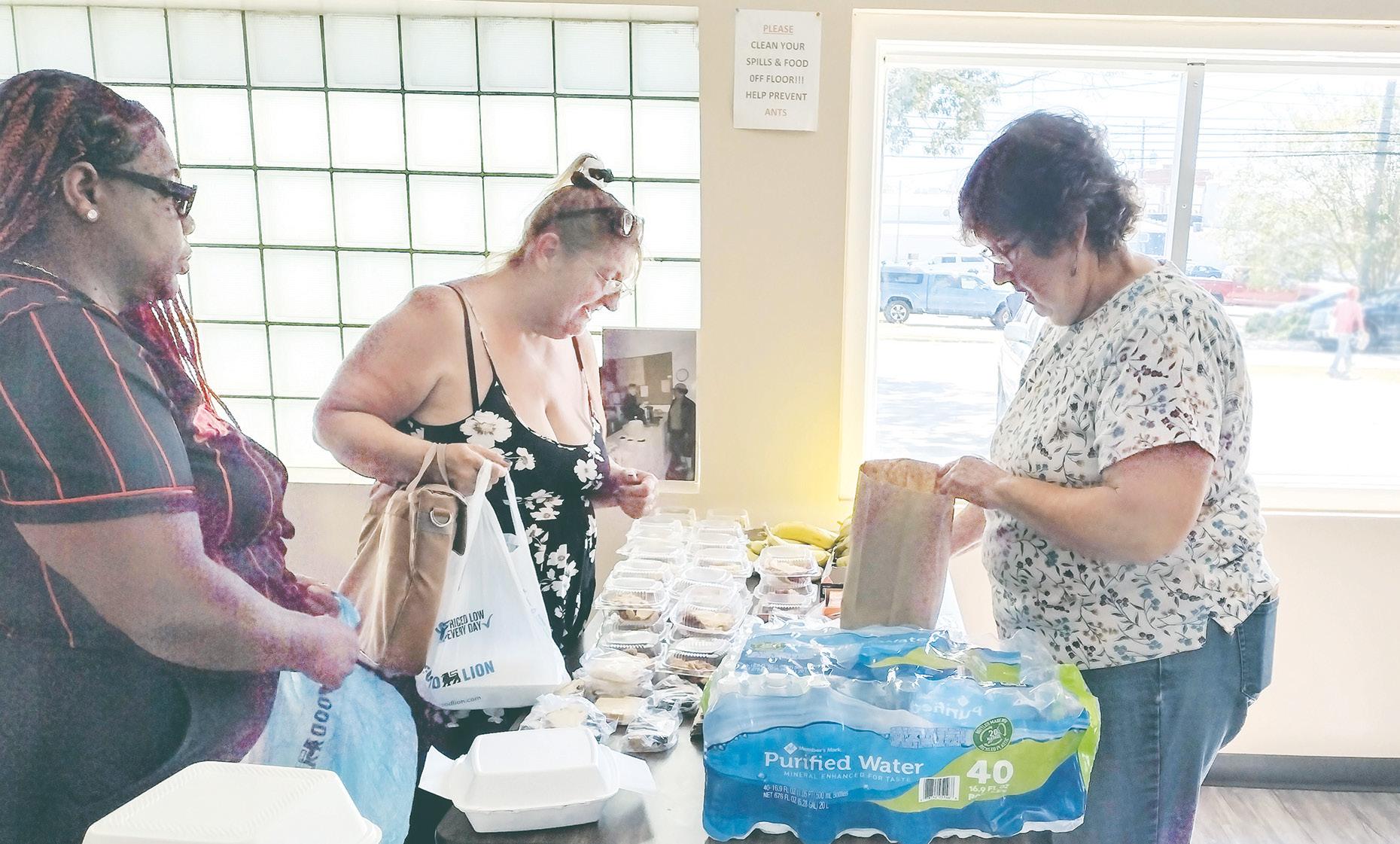
“It’s just a few hours and you just get so much more in return,” Devonshire said of volunteering there. “You
are supposed to be part of a community, you serve your community. This is very needed and they make it easy to be part of this.”
The volunteers use a mix of food donated directly to the kitchen or food they purchase themselves to cook. She encourages meals that can easily be stretched.
“Something like spaghetti. I’m sure our clients get so tired of it because that is something you can always do more noodles quickly or add another can of tomato sauce to the mix and make it stretch out as far as we can,” Heath said.
“As long as they have a flling meal, which is something that they can’t give themselves at that time, I think anything would be good,” she said.
Local supermarkets occasionally donate bread and baked goods. The manager of a Greenville Wendy’s once
called and said they had chili to donate if the kitchen could bring containers. Heath said they ended up with 10, one-gallon bags of chili in the freezer.
Another time, a tractor trailer driver had multiple pallets of bottled water break free from its packaging, and the recipient wouldn’t accept the shipment.
The driver called the Farmville Police Department, who reached out to Heath.
“We had 40 pallets of bottled water. The nice 20-ounce sized bottled water,” she said. The driver helped her move them into the kitchen where she posted a sign that the water was free to whoever wanted it. Within a few days, the water was gone.
In recent years members of Farmville’s community garden have donated fresh produce to the organization. The kitchen obtained a glass
front refrigerator where they store the donations and allow clients to pick up whatever produce they need.
On Aug. 23, the refrigerator held tomatoes, tangerines and sweet potatoes, Heath said. On Aug. 30, string beans, okra and English cucumbers were available. “Baked goods, cereal and that kind of stuf they leave in boxes on the table,” Heath said. “When folks come in and get a meal that is normally the frst place they think of looking to see if there is anything they can use.”
The volunteers also use the donated produce. Marlboro Free Will Baptist Church’s volunteers made a side dish of garden tomatoes and peppers to accompany their chicken casserole on Aug. 23.
Farmville Benevolent Ministries also stocks canned goods and shelf stable foodstufs for clients to pick up.
18
Lee Devonshire, a member of Marlboro Baptist Church, prepares a bag of baked goods and other snacks for clients at Community Outreach Soup Kitchen.
Along with the food donations, the soup kitchen also receives cash donations, Heath said.


Several churches give quarterly fnancial donations and groups within their congregations also make separate donations.
There are also individuals in the community who donate once or twice a year. The monetary donations are
needed to pay for services such as utilities, Heath said.
The kitchen needs fnancial help right now, she said. Its July utility bill was $600, a result of the multiple freezes and refrigerators that are used.
Clients appreciate the time and resources the volunteers give, she said.
In late June, Heath volunteered to help a member
Want to help?
Anyone interested in volunteering or donating money to the Community Outreach Soup Kitchen can call Heath at 252-917-4563.
of her church prepare a meal. The woman’s husband brought a grill and they served hamburgers and the fxings.
“People loved it. They loved everything they could get,” Heath said. “I think a lot of our clients appreciate the fact that there was someone out there willing to go to that extra trouble of making a meal for them. They truly appreciate anything we do.”
19
Farmville Benevolent Ministries stocks canned goods and shelf-stable food items at the Community Outreach Soup Kitchen so clients can pick up items to prepare food at their homes.
Community Outreach Soup Kitchen allows clients to pick out fruits, vegetables and other food items stored in a refrigerator near the kitchen’s front door.
can also mail a fnancial donation to: Community Outreach Soup Kitchen ℅ Emmanuel Episcopal Church 3505 S. Walnut St. Farmville, NC 27828
They
Waste not want not

20
The Carolina Poultry Power facility opened in 2019 on Marlboro Road in Farmville.
Photos by Rob Taylor via Carolina Poultry Power
Plant makes impact by recycling chicken litter to generate poultry power
By Pat Gruner
Clean energy comes in many forms, and anyone seeking proof need look no further than Farmville.
When one thinks of the aspects of a chicken least ft for functionality, their waste probably comes close to the top of the list. In Farmville, however, chicken leavings are serving as both a fuel
source and an economic driver thanks to the work of Carolina Poultry Power.
The power plant came onto the scene in 2019 under the guiding hand of Rich Deming, CEO of East Energy Renewables, a Farmville resident. Every year the relatively small facility processes 90,000 tons of waste into thermal energy to neighboring industries like Ham’s
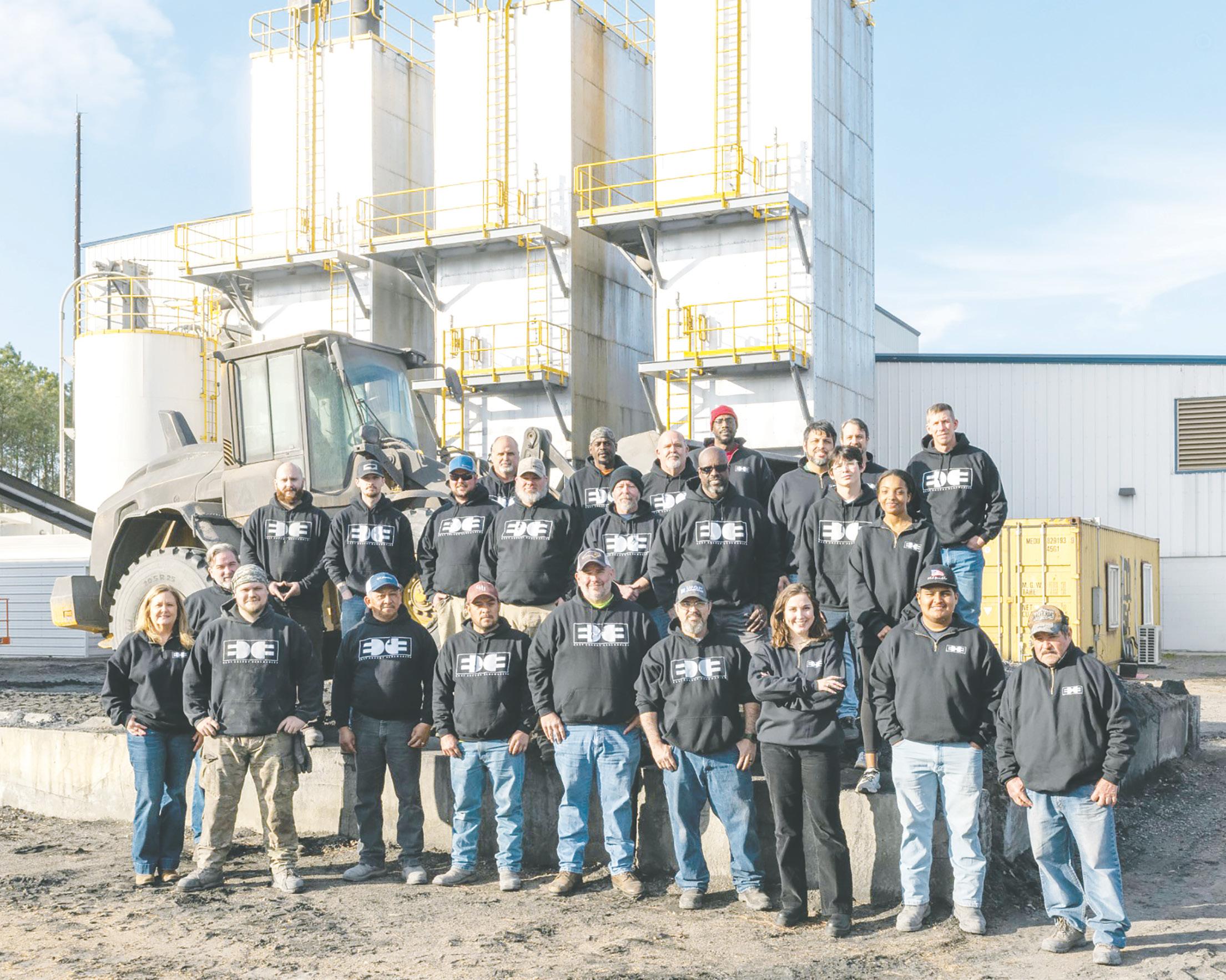
Yams facility. Two other plants operate in La Grange and Wilson, as well.
In 2007 North Carolina adopted legislation that created a renewable energy portfolio standard. Deming said that of the 37 states that bought into that standard, North Carolina is the only one in the South and the only one with specifc Renewable Energy Credits (RECs) for poultry and swine waste.
“It funds these plants, very unique to the country,” Deming said. “When you make one megawatt hour of electricity or thermal power equivalent, it’s attached to this ... ticket that certifes the
renewable component of the power. You can trade those around in utilities because they’re obligated by the reps who buy them from us.”
The plant works with seven such representatives including giants like Duke Energy and smaller companies.
Businesses like Ham’s use the energy from Carolina Poultry Power’s facility to blanche their yams, adding another layer to the agricultural makeup of Farmville’s economy. To David Hodgkins, Farmville’s town manager, headquartering the new wave of agricultural fuel fts with the town’s history and future.
21
The team of East Energy Renewables poses for a photo outside the Carolina Poultry Power facility in Farmville.
“The town is named Farmville,” Hodgkins quipped. “It’s rooted in agriculture. Tobacco was king historically and we had the Monk family, Monk Warehouse, and later iterations like Alliance One and Pyxis that were involved in the tobacco industry.”
“Farmville is just well positioned for that industry,” Deming said. “We’re basically taking 90,000 tons (of waste) and sizing it down to have the same impact on the environment as 100 tons.”
“It’s going through a gasifcation process where it’s basically being eliminated. It’s combustion. It’s in a twostage boiler situation with about four stages of emission controls.”
That makes roughly a megawatt of power, Deming said, about enough to light up the circuit around Farmville. While that leaves the plant’s output relatively small compared to others, the big takeaway from its work is the diversion of poultry waste from the environment.
“Where this litter goes,
if it doesn’t go to us, is it’s land-distributed through fertilizer,” Deming explained. “When you use it for fertilizer the nitrogen is awesome, everybody loves the nitrogen, but the potassium and the phosphorous is way over-luted. Since it’s not fxed at the plant level, when it rains it’s just washed of the felds into the ditches and eventually makes its way into the rivers.
“In North Carolina we’re kind of ahead of that problem because we’re diverting so much of this stuf.”
Getting the plant to Farmville initially came with some concerns from citizens, Hodgkins recalled. Namely, the idea of living in a town that smelled of chicken leavings. He said that Deming and company came up with some creative means to assuage those worries.
“(Carolina Poultry Power) has overcome a lot of obstacles from perception of bringing stinky poultry waste to town in big trucks and all that,” Hodgkins said. “I
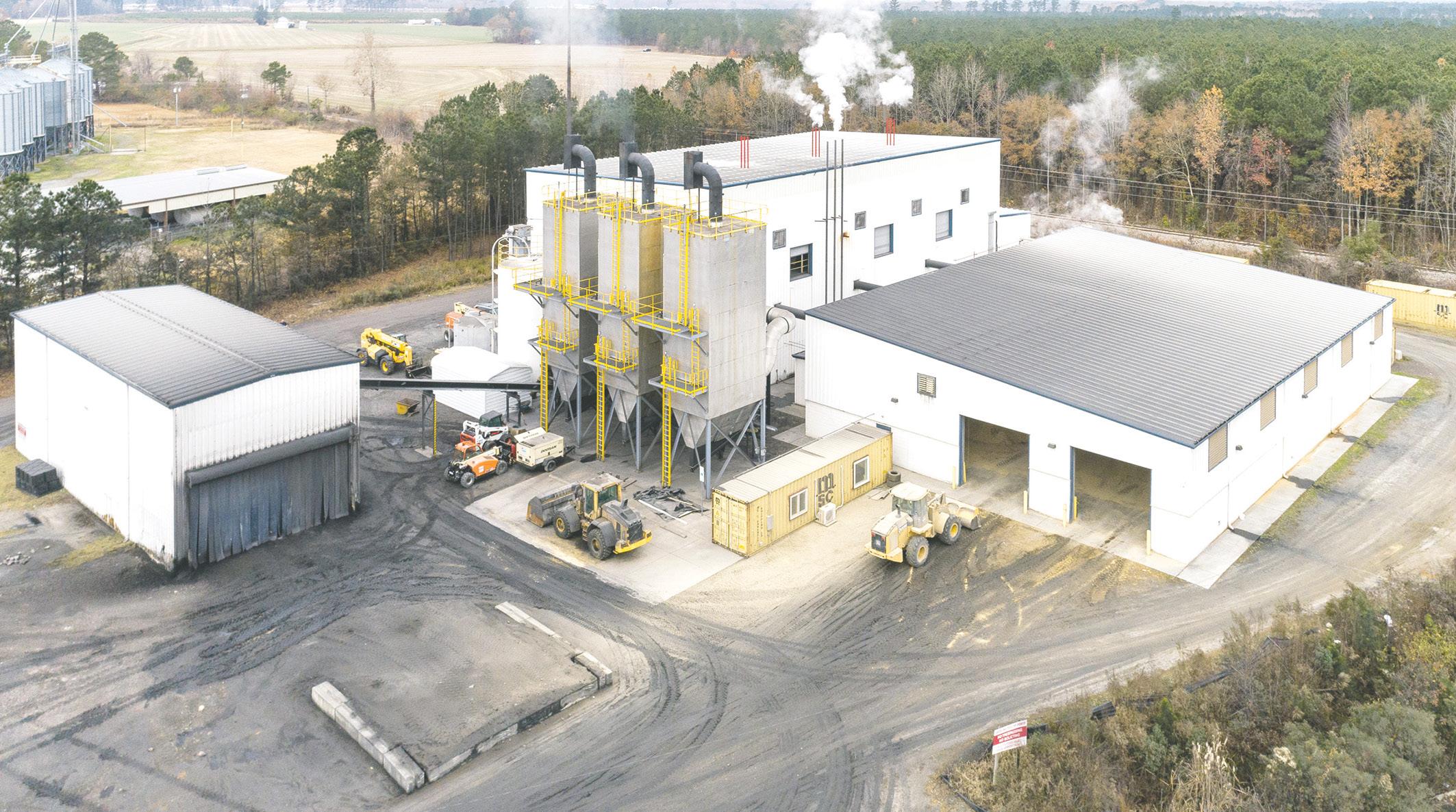
thought it was very clever of them to hold public meetings.
“There was a bucket, nondescript bucket, of basically ... poultry litter that was ... behind the table where everyone got their name tag and signed in. There were a lot of people who stood up and asked a lot of questions about the smell, environmental impacts, and at the end of the meeting it was pointed out that everyone who came into that meeting passed within 10 feet, maybe even closer, of that bucket of poultry litter in that corner,” Hodgkins continued. “Not one person even smelled it or implied that there was even a smell.”
An Oct. 3, 2022, Environmental Justice report published by the N.C. Department of Environmental Quality, the department’s Division of Air Quality determined that the emissions from Carolina Poultry Power’s facility would not pose unacceptable health risks.
In taking the commitment
to relay waste away from waterways a step further, Farmville in July was set to receive up to $3 million from the State Water Infrastructure Authority for a project that would divert efuent water from its wastewater treatment plant to Carolina Poultry Power.
About half of that will be in the form of a grant and the other half in the form of an interest-free loan which, if certain milestones are met, will also convert to a grant.
That water is undrinkable, but it can be used to cool the facility according to Deming. Hodgkins said that he has hopes the plant will serve as a recruiter of sorts to companies seeking alternative energy solutions who want to make Farmville home.
“This could be adapted by certain industries for their processing of whatever goods they’re producing,” Hodgkins said. “Heating water, heating the facility even, at least a cut of utility costs. We see it as a complementary type of industry.”
22
An exterior shot shows Farmville’s Carolina Poultry Power plant in 2021.















































































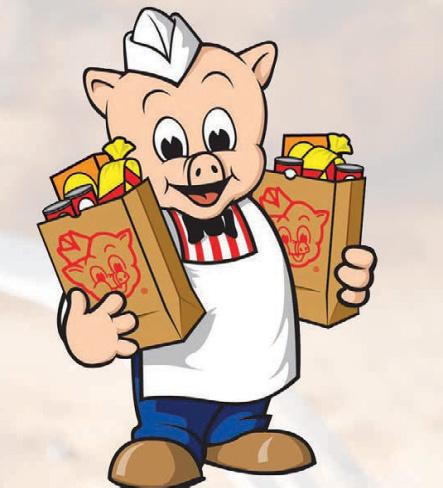


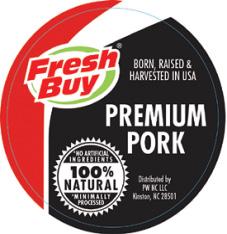


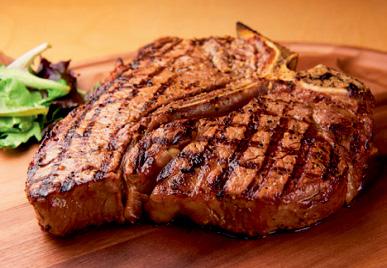













23 252-753-2550 brannandsonsac.com AC and Heating Replacements • AC and Heating installations Commercial and Residential • Sales and Service Quick Response Time • Licensed and Insured 2038 Tyson Chapel Church Rd. • Farmville Lic#08569 —G & N— Mini Storage 252-355-6003 WWW.MINISTORAGENC.COM RESIDENTIAL, COMMERCIAL, RV AND VEHICLE STORAGE SPACES AT AFFORDABLE PRICES Bisc uitp ro mi se sfrien dly ser vi ce with at te ntio nto cu stomersatisfactio n! Giving YouPeace of Mind with Reliable and Secure Service Call for availability and pricing Serving Eastern NC since 1993



24
Rich in Scouting tradition
Farmville Troop’s history spans generations
By Bob Garner
In the United States, as elsewhere around the globe, Scouting thrives in locales ranging from small communities to large metropolitan areas. But Farmville — current population about 4,500 — has provided rich soil that’s given root to an especially rich, 104-year-old Boy Scouting tradition.
Farmville’s Troop 25 was frst formed only 12 years after Scouting was formed in England in 1907 by Sir Robert Baden-Powell in conjunction with the frst experimental camp on Brownsea
Island, of the Dorset coast.
It seems particularly appropriate that the founding of the Boy Scouts of America had its genesis in a “good turn” performed by an English Scout in aid of a traveling American businessman lost in a thick London fog.
William Boyce, guided to his destination by a Scout who declined any payment for helping the disoriented American fnd his way, founded the Boy Scouts of America not long afterward in 1910, aided by other businessmen as well as educators and political leaders of the time.
Farmville’s Troop 25 has amassed a salutary record in terms of the number of Eagle Scouts in successive generations since then, as well as the number of former Scouts who have served as Scoutmasters, Assistant Scoutmasters, members of the troop committee, merit badge counselors and in other adult roles.

Andrew Stephens, who’s among several Troop 25 Assistant Scoutmasters and its unofcial historian, said the Rotary Club of America challenged every local club to sponsor a Boy Scout troop in 1918. Farmville’s Rotari-
ans took up the challenge in 1919. “There are no surviving written records from that frst organization, and it didn’t last but a few years,” said Stephens. “The ofcial founding of the troop didn’t happen until a decade later in 1929, but we do have written records and registrations to support that (1919) founding date, which is why it appears in our signage and banners.” Stephens said there was a brief inactive period for this troop (and many others across the country) during the late years of World War II, due largely to wartime rationing of both
25
Troop 25 Scouts at a 1942 Council Camporee.
(Archival photo)
gasoline and food, but that the troop was quickly reorganized.
“There was, of course, no local Scout camp for that frst 1919 group, but oral tradition indicates that one of its favorite places to go camping was Lake Waccamaw in Columbus County, west of Wilmington, which is now a North Carolina State Park,” Stephens said, emphasizing the logistical challenges of
arranging transportation alone in those earliest years.
According to the Boy Scout Handbook, American troops are organized in patrols of six to eight scouts each (with one elected patrol leader), with other youth leaders such as a senior patrol leader, junior assistant Scoutmaster and others adding to the number. Stephens said that on any given meeting night at Troop 25’s dedicated

Scout hut, “We may have around 30 boys show up, and we’ll typically have 15 adults there ready to assist, whether it’s helping to get something signed of for a rank advancement, getting something checked of on a merit badge or whatever. We also get great help from nearly all the parents with fundraisers like our annual chili cook-of, giving scouts rides to camping trips or helping with the
logistics of various service projects.”
He added, “In Farmville, Scouting has that small town, close-knit feel. For example, we have a used uniform program, so that if a boy leaves the troop or grows out of a uniform, a new Scout doesn’t necessarily have to start out with that expense at the beginning or, later, can get perfectly good hand-medowns from the older boys.”
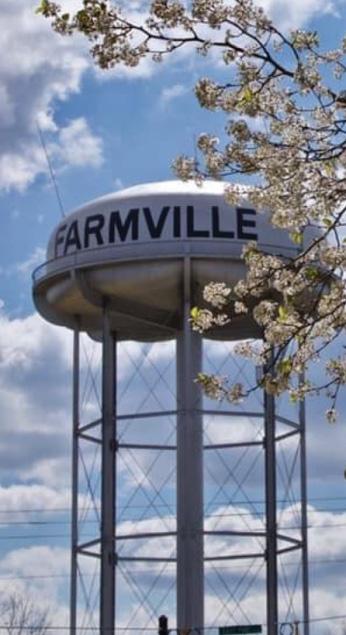
26 Supporting the Community For Over 45 Years South Field Street |PODrawer 809 252.753.5323 www.MESTEK.com
Troop 25 members camping trip in the NC mountains during the 1970s. (Archival photo)
At the 2007 Farmville Christmas parade, geared-up Troop 25 Scouts continued hiking past the parade route directly to an overnight camping trip. (Archival photo)
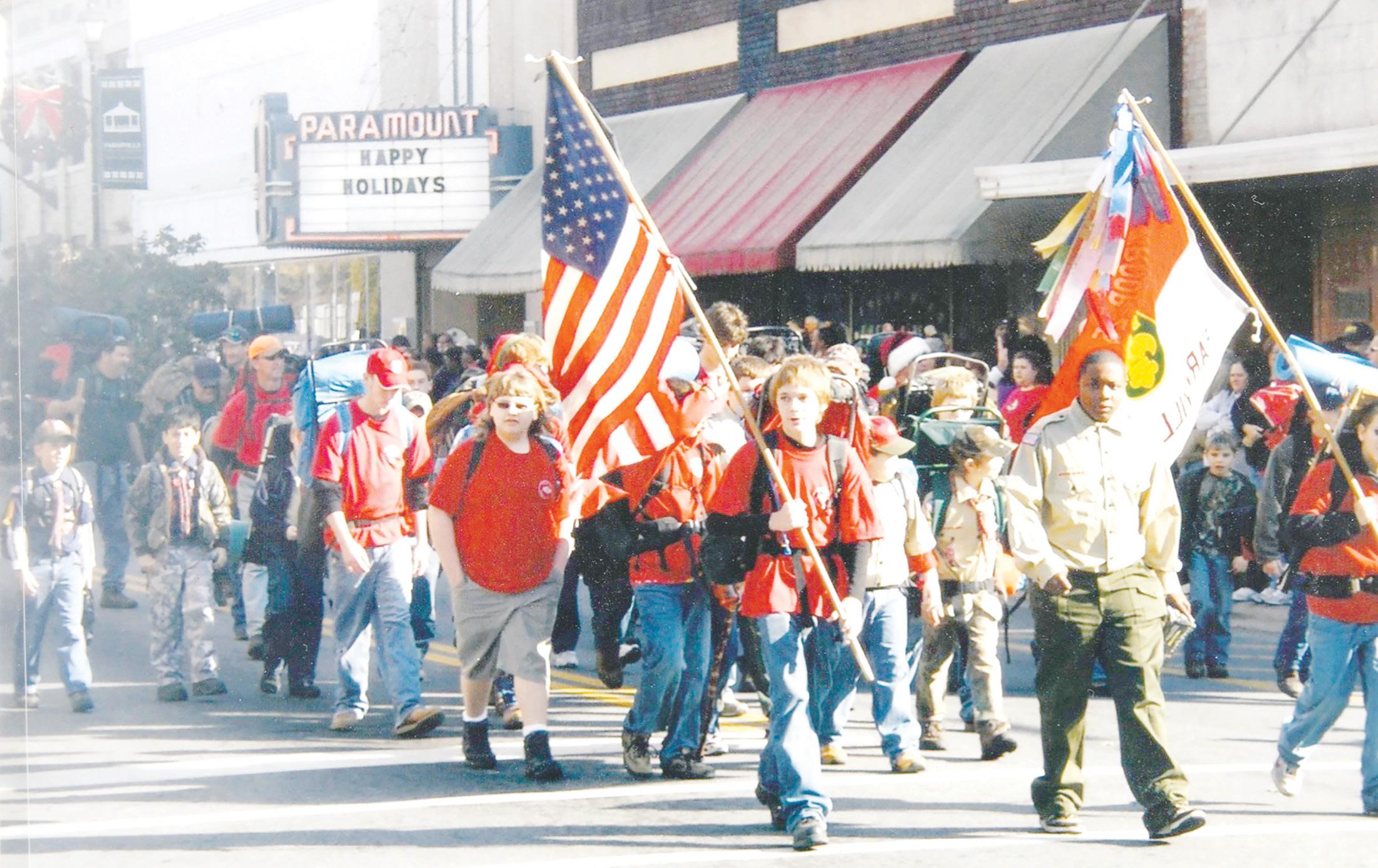
When you need tools, oil for your car,orother hardwaresupplies, come to Farmville Hardware Lawn &Garden. When you come to us, you’ll be treated likegood friends and family.
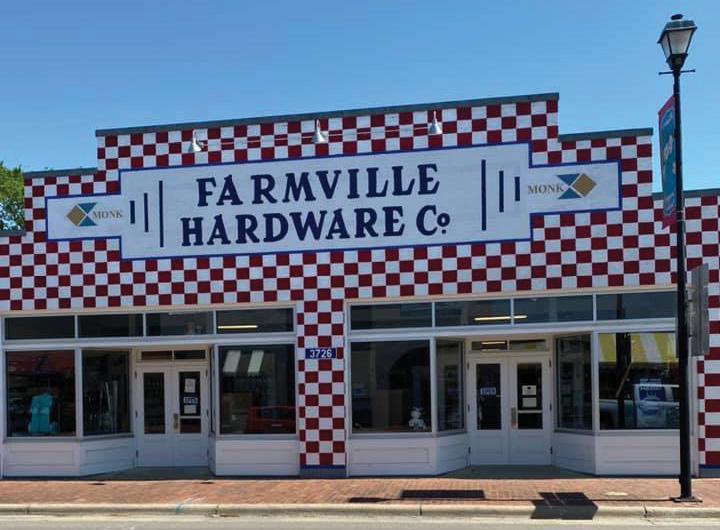
3726 W. WilsonSt.


Farmville *753-1100

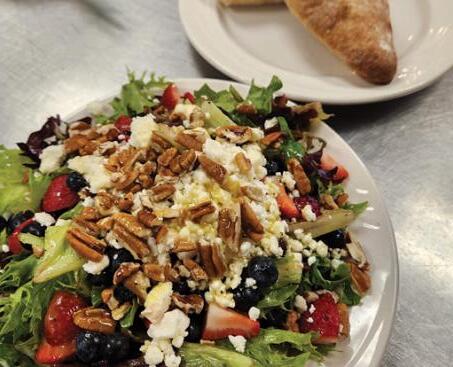
walstonburghardware@gmail.com






farmvillehardwarelawnandgarden.com











27
3699 EWilson Street
NC 27828 (919) 594-7553 cafemadeleine_3699 cafemadeleinefarmville.com Catering Custom Cakes Pastry •Wine Lunch Charcuterie
Farmville,
(Archival
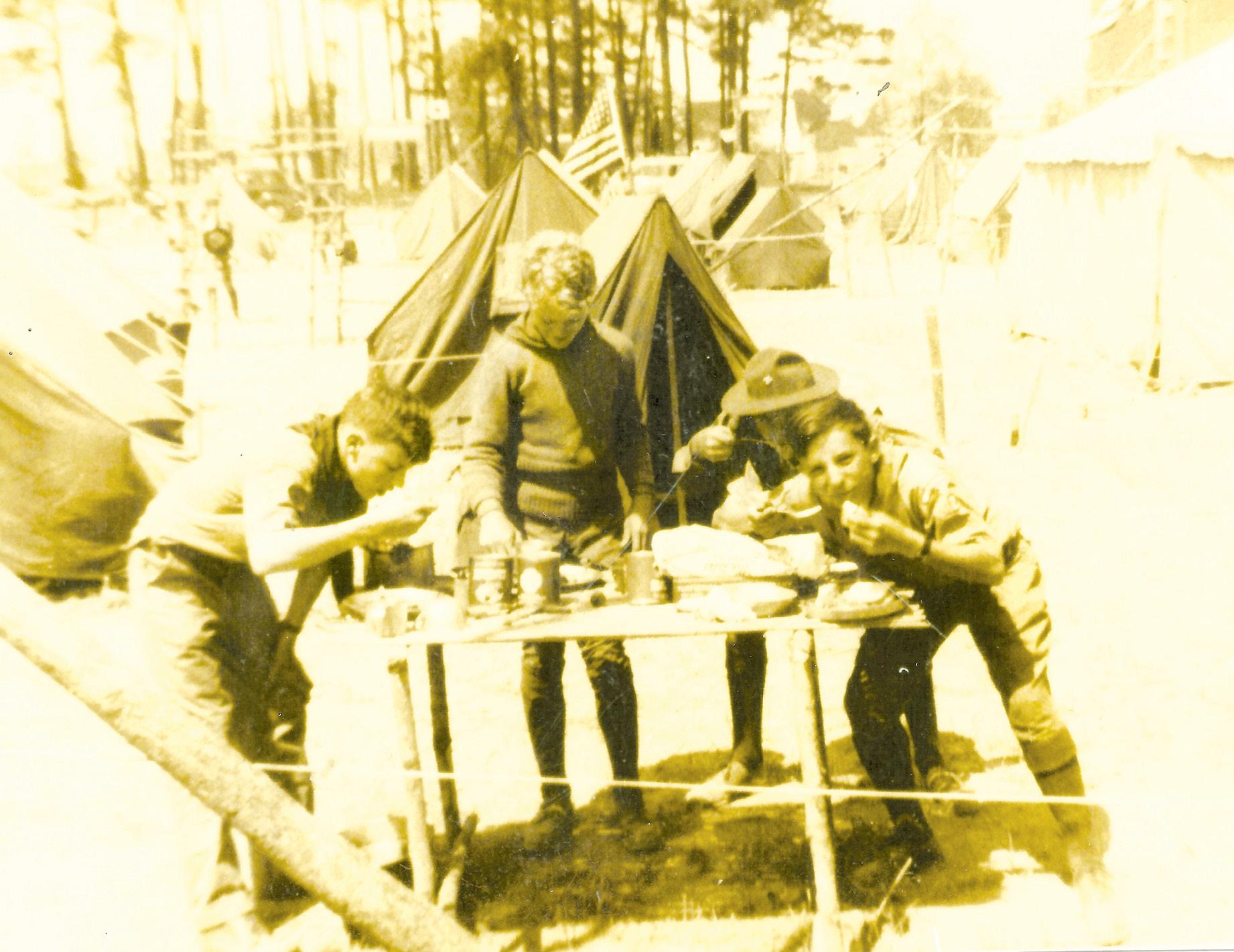
Various regional Scouting councils were organized over the years across North Carolina and the rest of the country, Stephens said. “We’re now part of the East Carolina Council, which has nine districts encompassing 22 counties, and we have our own summer camp, Camp Boddie, west of Vanceboro, near the Pamlico River. There’s a Sea Base nearby, right on the river, with a dock to enable activities like working on a small boat sailing merit badge and a motorboating merit badge, as well as jet skis, kayaks and canoes for the kids to use.” None of this has happened
without Scouts and adult Scouters putting in untold hours of work on service projects, not only at its council facilities but throughout the Farmville community and neighboring vicinity. Scouting handbooks make it clear that service projects are required as part of advancement through the ranks, and reaching the Eagle Scout pinnacle requires another service project in addition to earning the requisite 21 merit badges. (Eagle Palm pins are also bestowed with the earning of every fve additional merit badges within a minimum three-month period
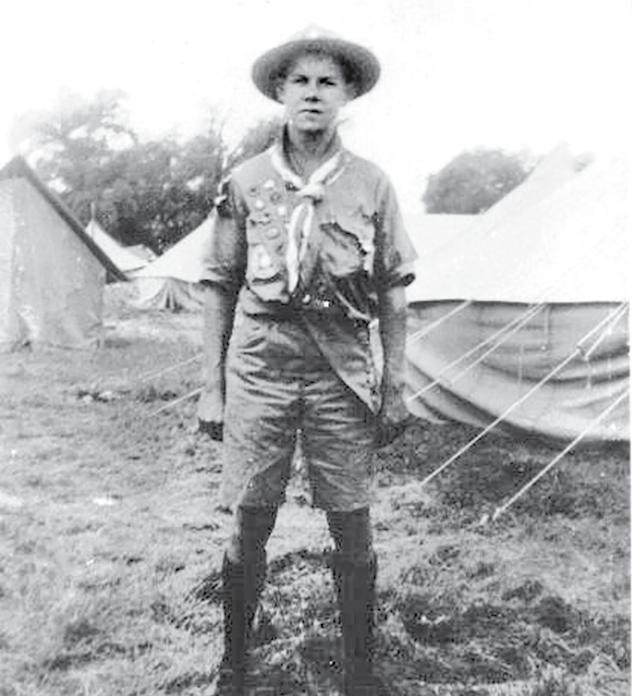
28
Troop 25 Scouts at a 1942 Council Camporee.
photo)
Troop 25 Scout Horton Roundtree attended the 1937 National Jamboree in Washington, D.C., and was presented his Eagle Scout medal there by Chief Scout Executive James E. West.
(Archival photo)
Garden, site of numerous Troop 25 service projects.
for each Palm awarded.)
In Farmville itself, Scouts have built seating benches along the road between the high school and middle school, according to Stephens, and a great number of service projects, including Eagle projects, have taken place at the Farmville Community Garden, which has free, raised-bed plots
available to town residents. Troop 25, along with other troops, also has done a lot of community service at The Refuge, a Christian summer camp and year-round retreat center in Greene County. Scouts have poured concrete pads, helped erect shelters and other structures and raised fagpoles, among other things, said Stephens.

Perhaps no family has been more representative of Troop 25’s impact on the community through the years than the Flanagan clan.
Harold Flanagan, who Stephens said may well be the oldest registered Scouter in the East Carolina Council, was a Troop 25 Scout in the 1950s. He earned the Eagle Award, as did two sons, Jerry
and Mark.
Jerry is a former Scoutmaster and veteran Scout volunteer. Mark has been a long-time Scouter in various capacities and fathered three sons who climbed the ranks: Arch and Jack, who have already earned the Eagle award, and Sam, who has only to complete his Eagle project to do the same.
29
Troop 25 Assistant Scoutmaster Mark Flanagan and youngest son Sam, stand at the Farmville Community
Photo by Bob Garner
Harold is now 88 years old and is a retired farmer. He told me in an interview that he most loved being involved in Scouting through the years with his best friend, the late Jack Farrior, who died in 2018 at the age of 82.

“Jack and I worked together on all sorts of Scout projects, including cooking for adult Scouters at camporees,” he said. “He called
his particular feeding area ‘Jack’s Bistro.’ And it was always within a hundred yards of the Troop’s camping area — but far enough away to reduce the number of adults underfoot in camp, which helped create space for more hands-on leadership from the older, more experienced Scouts themselves.”
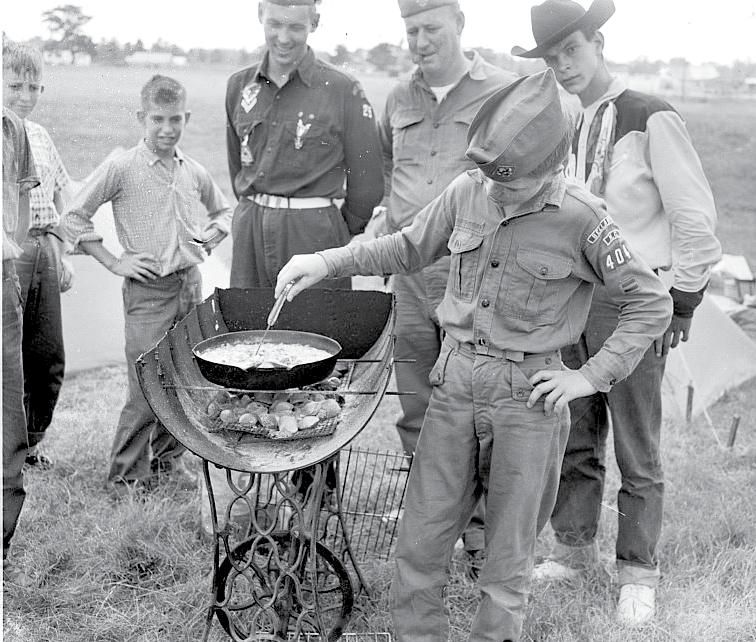
Troop historian Stephens summed up Troop 25’s
heritage in saying, “A lot of parents are involved with the troop while their kids are in Scouting, but we also seem to have had an unusually large number of Scouters who stick around for a long time. My own kids are now 27 and 30, and yet I’m still involved regularly with Troop 25, and I intend to continue that as long as I’m able.”
30
Scouts cook up some grub at a camporee in 1958. Farmville Troop 25 Eagle Scout Harold Flanagan, now 88, stands in the center in the dark green uniform behind the cook. (Archival photo)
Jack Farrior


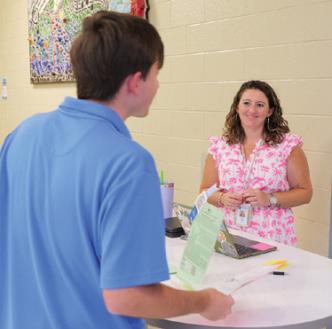
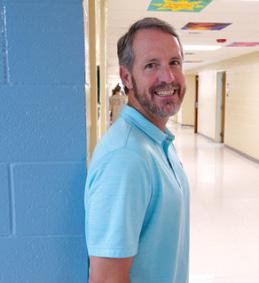

31 www.pitt.k12.nc.us/careers Join our team andbepart of our story. SCAN For PCSJob opportunities HIRINGNOW Farmville •Ayden •Bethel •Falkland• Fountain •Greenville •Grifton• Grimesland •Simpson• Winterville growpittcountync.com Economic Development
Farmville Veterans
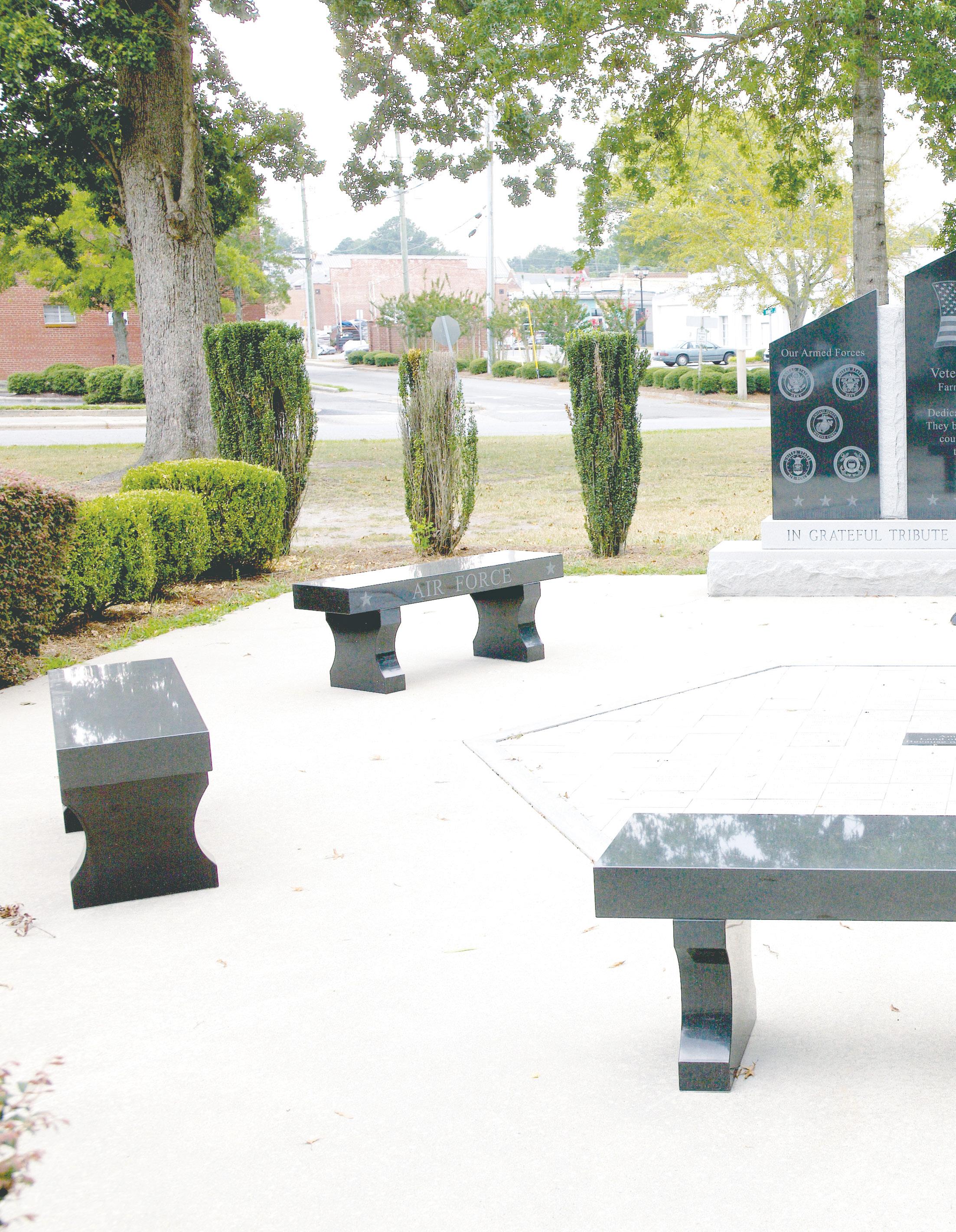
32
Memorial: A look back
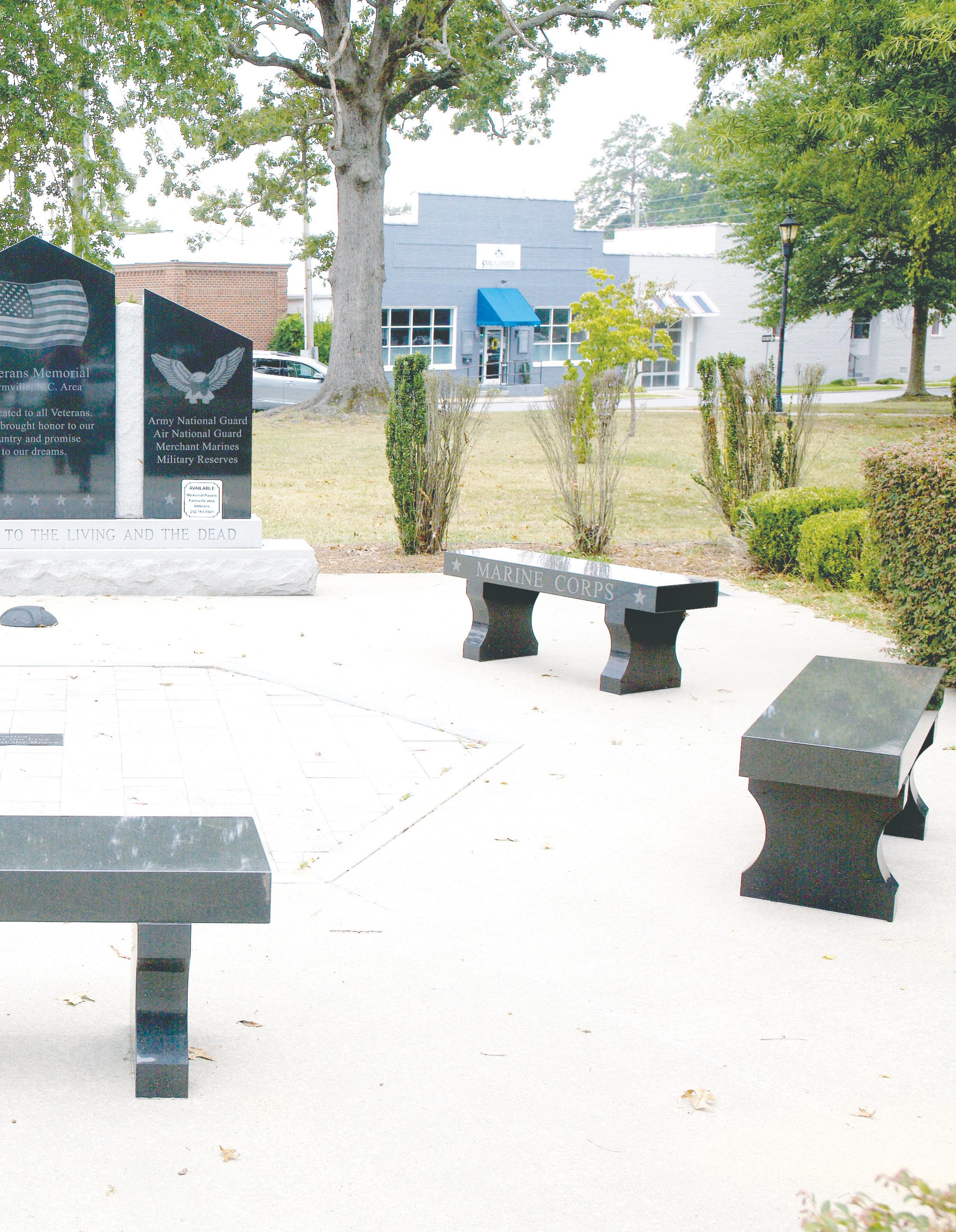
33
Monument dedicated 15 years ago
By Donna Marie Williams
When Veteran’s Day comes around this November, it will mark the 15th year that folks in Farmville have a dedicated space to refect on their service.
Community members in the mid-2000s decided Farmville should join other municipalities in the area to create a monument to veterans of the U.S. armed forces.

Working with the town to place a monument at the Walter B. Jones Town Common, volunteers formed a committee to carry out the task. Dr. Bert Warren, a former captain in the U.S. Air Force, was among many who served on the committee.
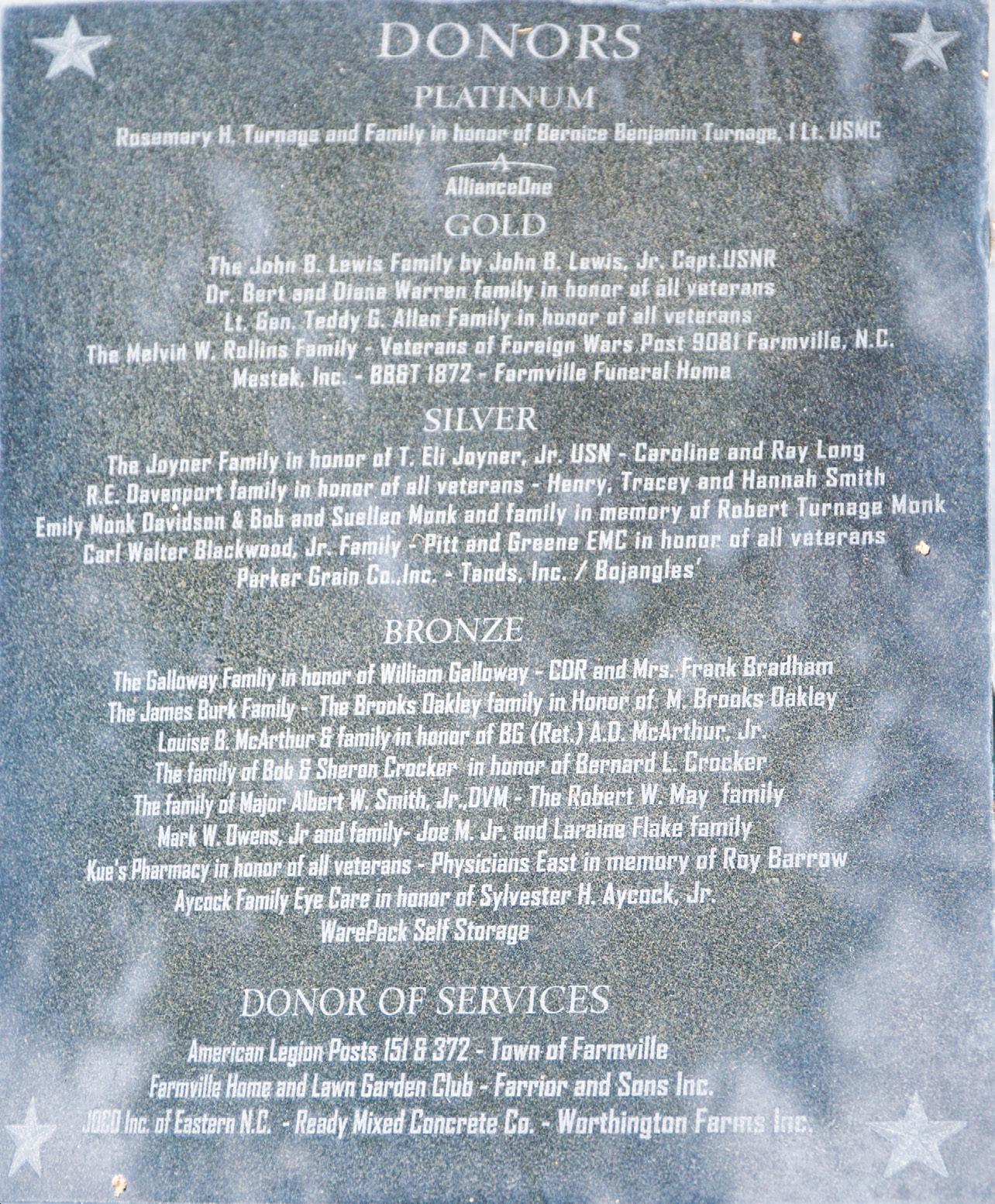
“When you visit other communities, you can see their veterans memorial. We didn’t have that. We wanted to have some sort of recognition for their gift of life and their gift of service for our community,” Warren said.
Planning soon began with the group gathering input to develop an inclusive monument representing all those who served the nation, Warren said.
“Almost immediately when we indicated we were going to do this project, people came in and wanted to help,” he said.
“The enthusiasm we had in every meeting that we had, the ideas that came forth from the whole group of people, everybody contributed and made suggestions. We voted on it. We worked together as one of the best groups I ever worked with. We had a purpose,” Warren said.
The committee used a quote from Ronald Regan as its guiding principle, Warren said.
“Ronald Regan said, ‘There is no limit to what a man can do or where he can go if he doesn’t mind who gets the credit.’”
Donations also began to roll in with the committee raising more than $100,000.
34
Working with experts from Greenville Stone and Granite, the committee designed a striking monument of black marble set in gray granite that pays tribute to each of the military branches — Army, Navy, Air Force, Marines and Coast Guard — as well as Army and Air National Guard, Merchant Marines and military reserves.
Inscriptions read “Dedicated to all veterans. They brought honor to our country and promise to our dreams” and “In grateful tribute to the living and the dead.”

The carefully landscaped site also features fve black marble benches, each representing one of the military branches. The benches form the shape of a pentagon and surround brick pavers engraved with the names of donors who helped make the monument possible.
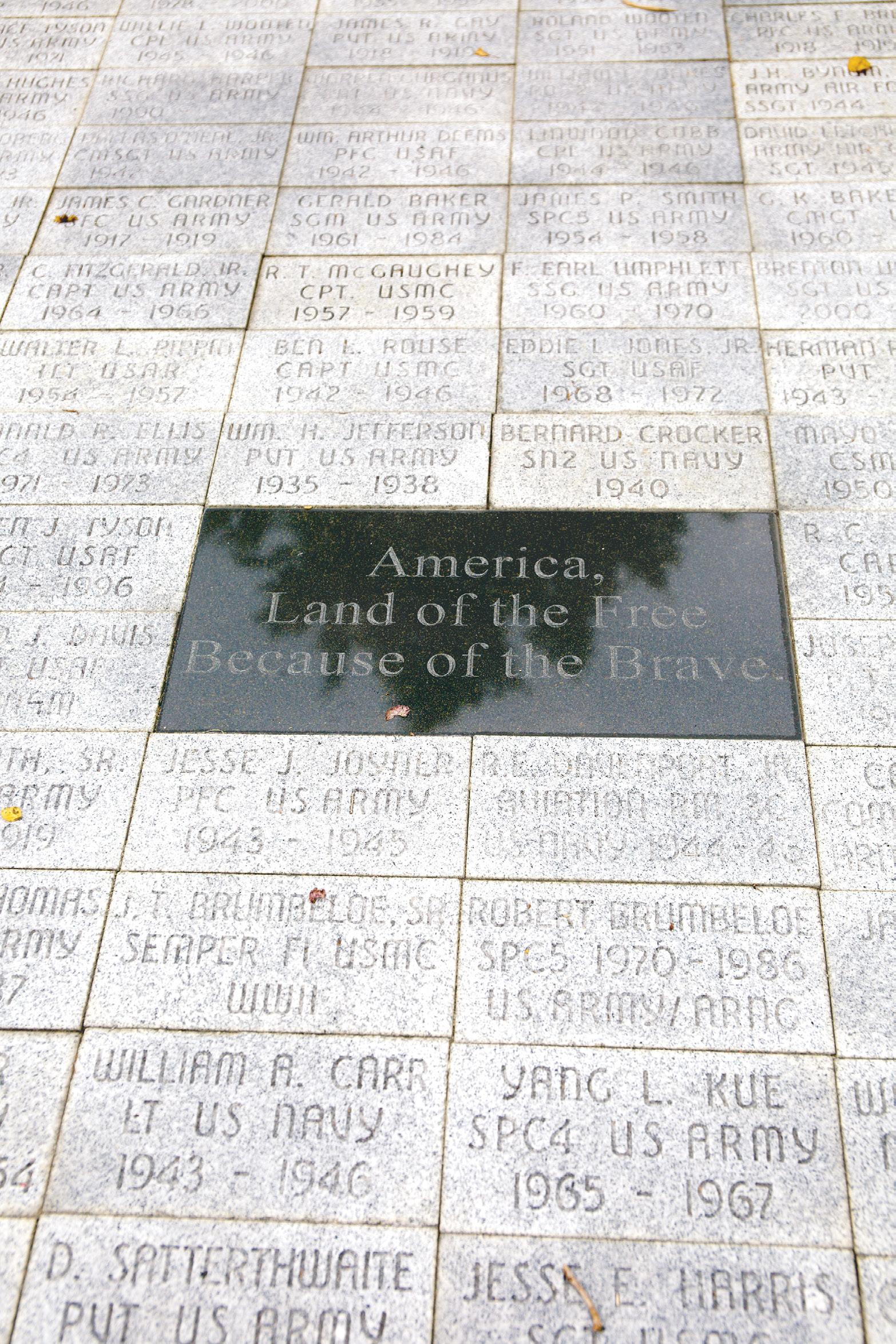
Warren said Farrior and Sons erected the monument, and Worthington Farms donated the shrubbery and helped with the landscaping.
With the money raised, the committee was not only able to pay for the monument’s material and construction but it had enough left over to set some aside for ongoing maintenance. They also were able to make a donation to Pitt Community College for veteran scholarships.
The Farmville Veteran’s Memorial was dedicated on Nov. 1, 2008, a short time after it was completed.
The memorial today has become a beacon for the town while serving as a place for the community to refect and remember the cost of freedom, Warren said.
35



36 Service from adependable HVAC company that will provide you with quality repairsand the routine maintenance needed to keep your unit running properly and efficiently.With our35plus combined years of experience,Elite Mechanical Heatingand Air Inc. is the preferred residential and commercial HVAC company for many Eastern North Carolinians. 3931 Lee St.,Ayden 252-746-6200 www.elitemechanicalnc.com EXPERIENCE THE COMFORTOFEXPERTS Your Local Residential &Commercial HVAC Company! Serving Ayden, Greenville, Kinston, Far mville, Snow Hill &Washington Call 252-746-6200 for affordable air conditioning &heating services.





























































































































